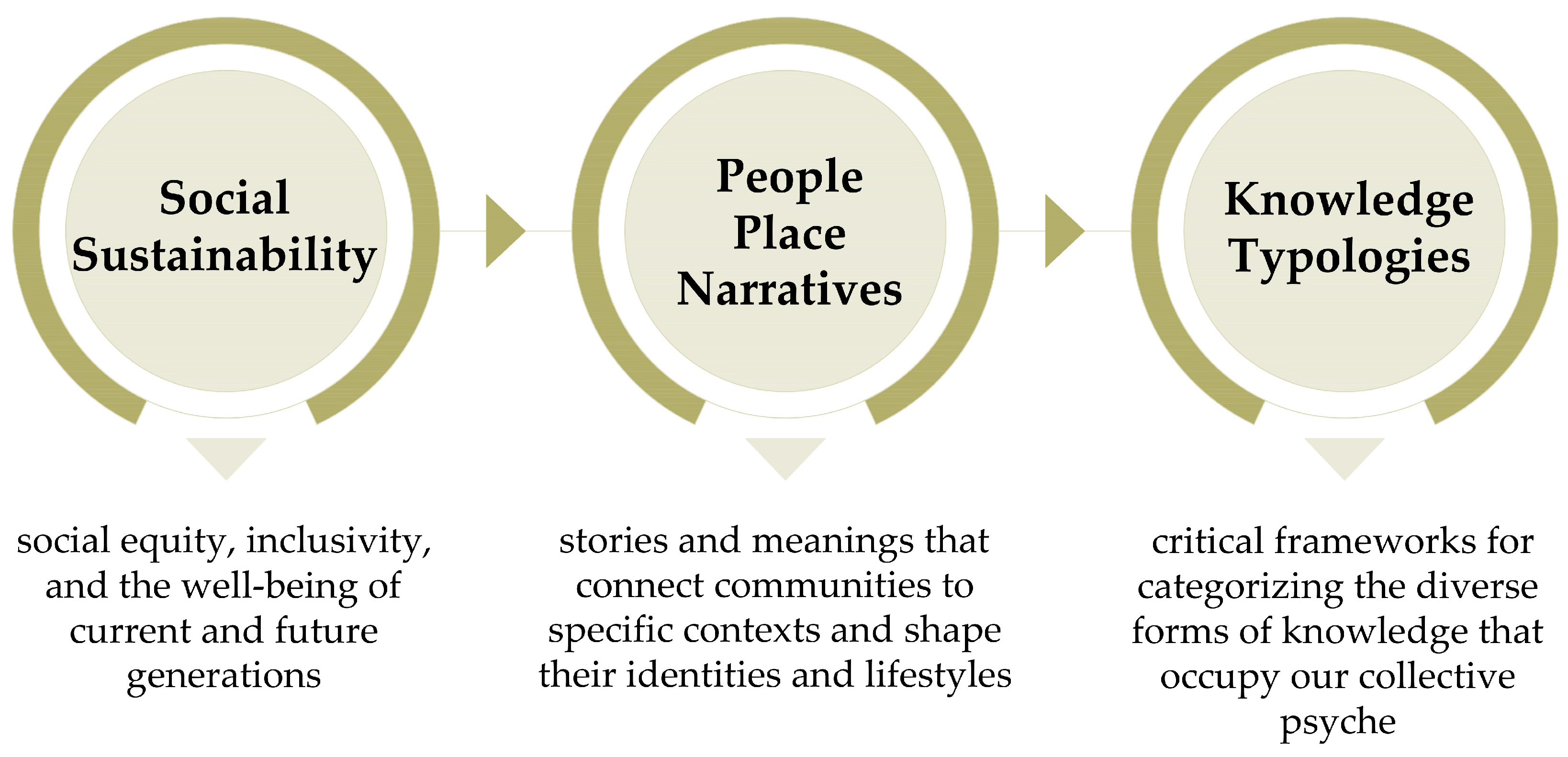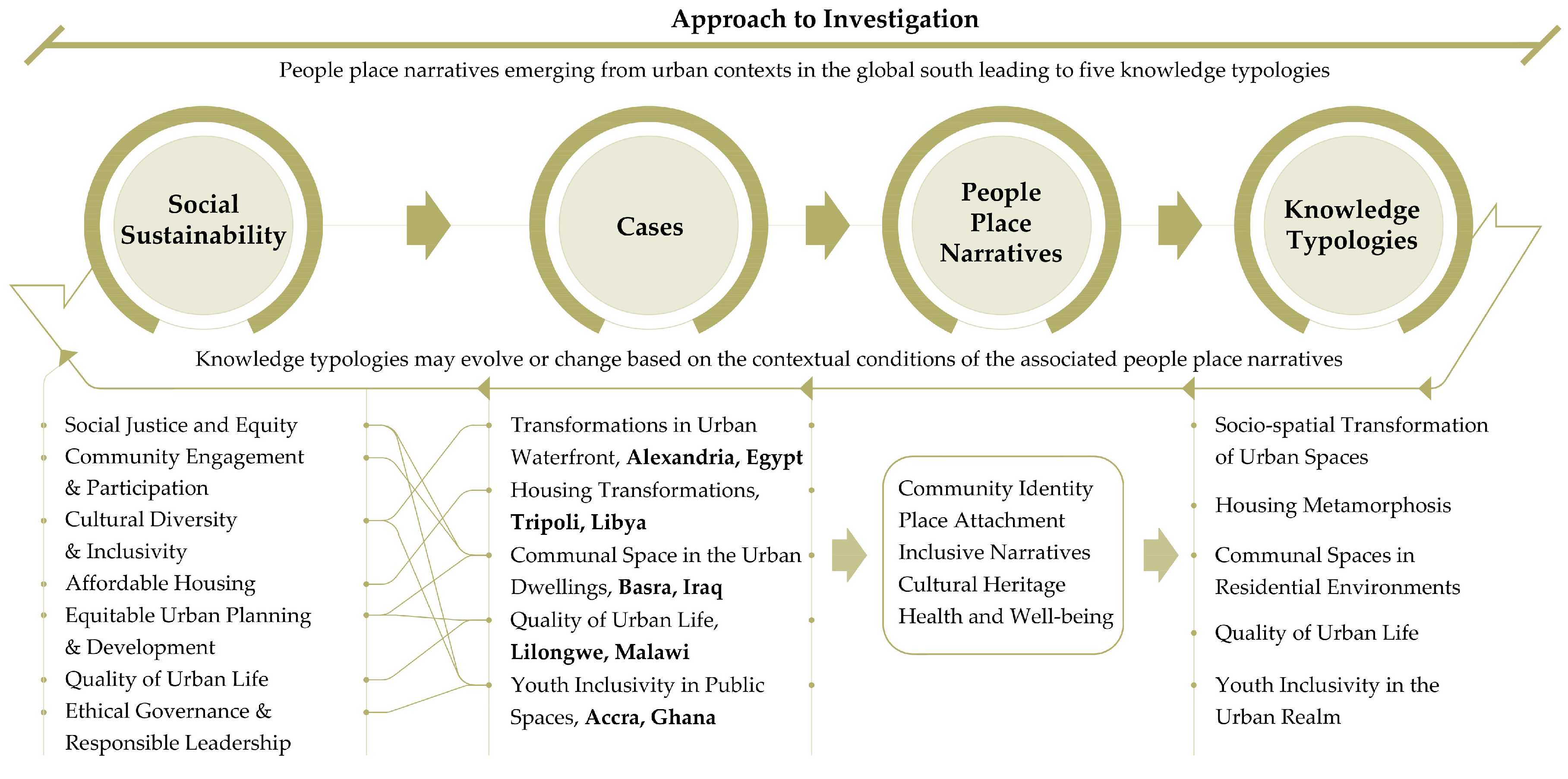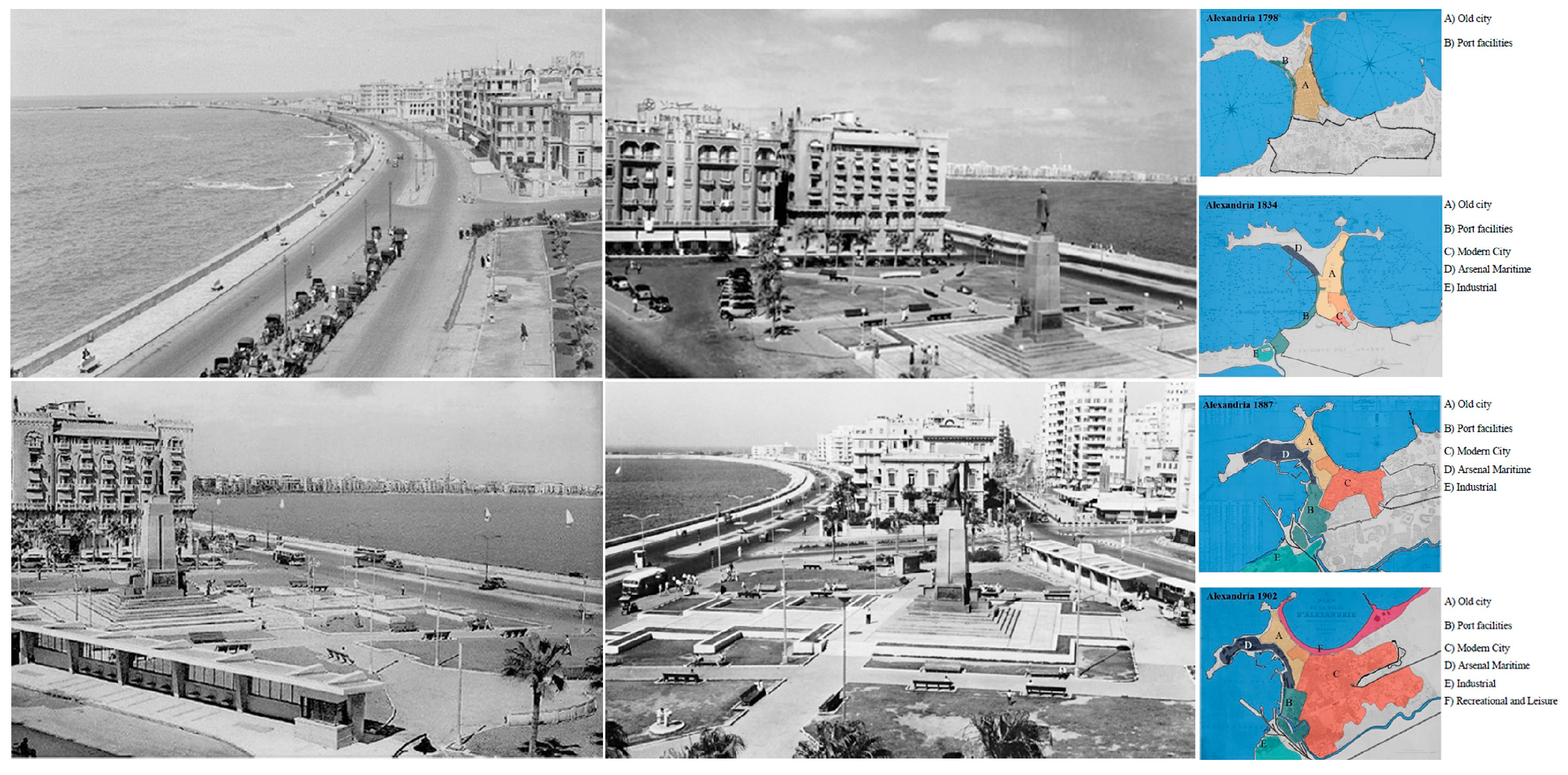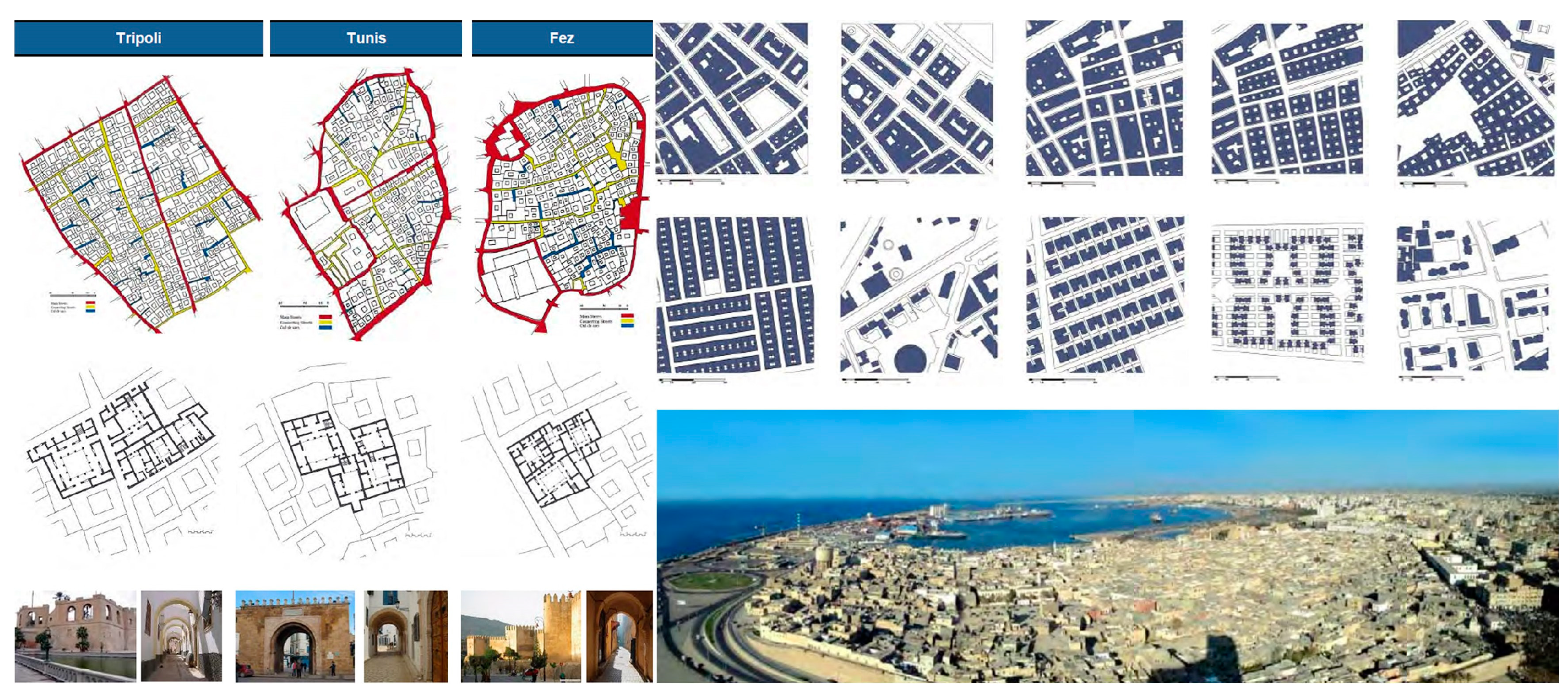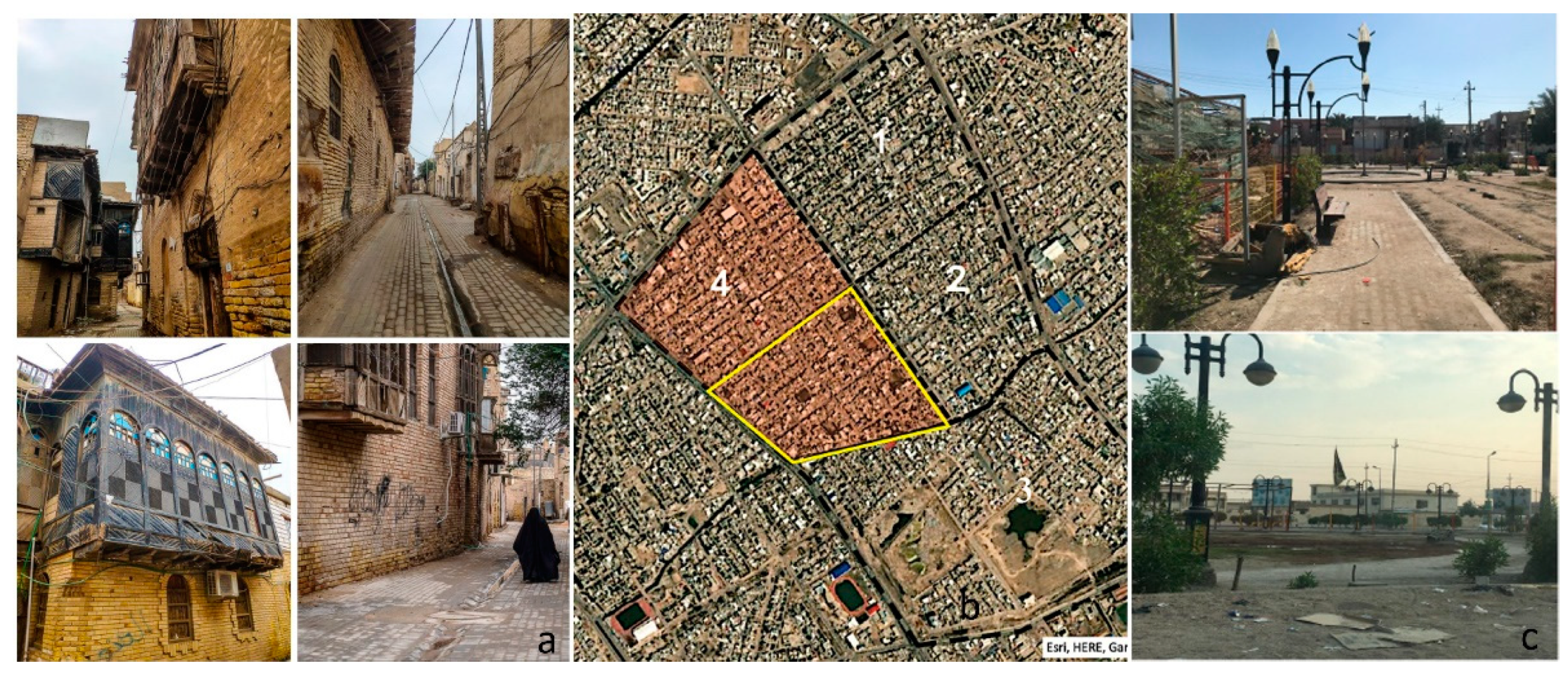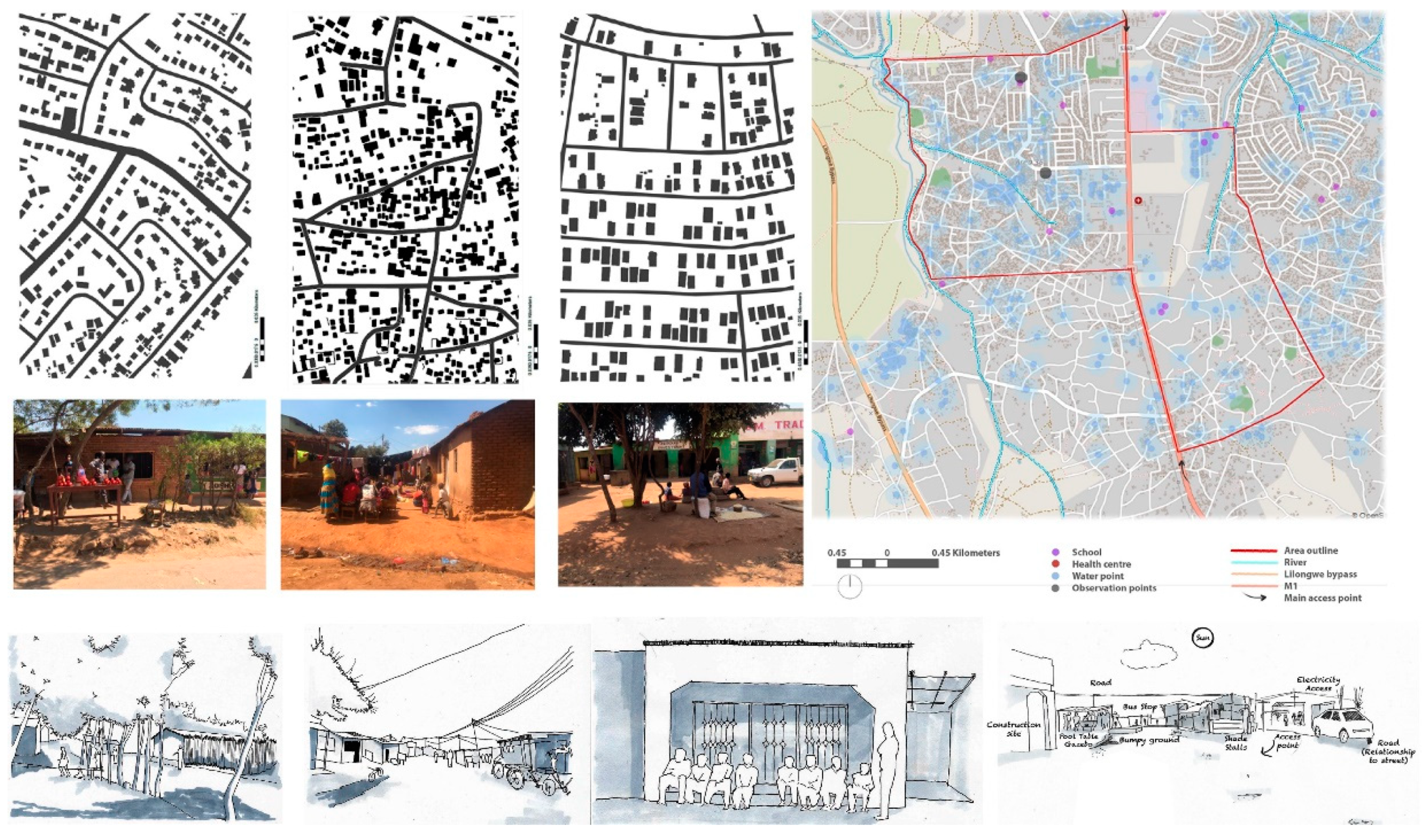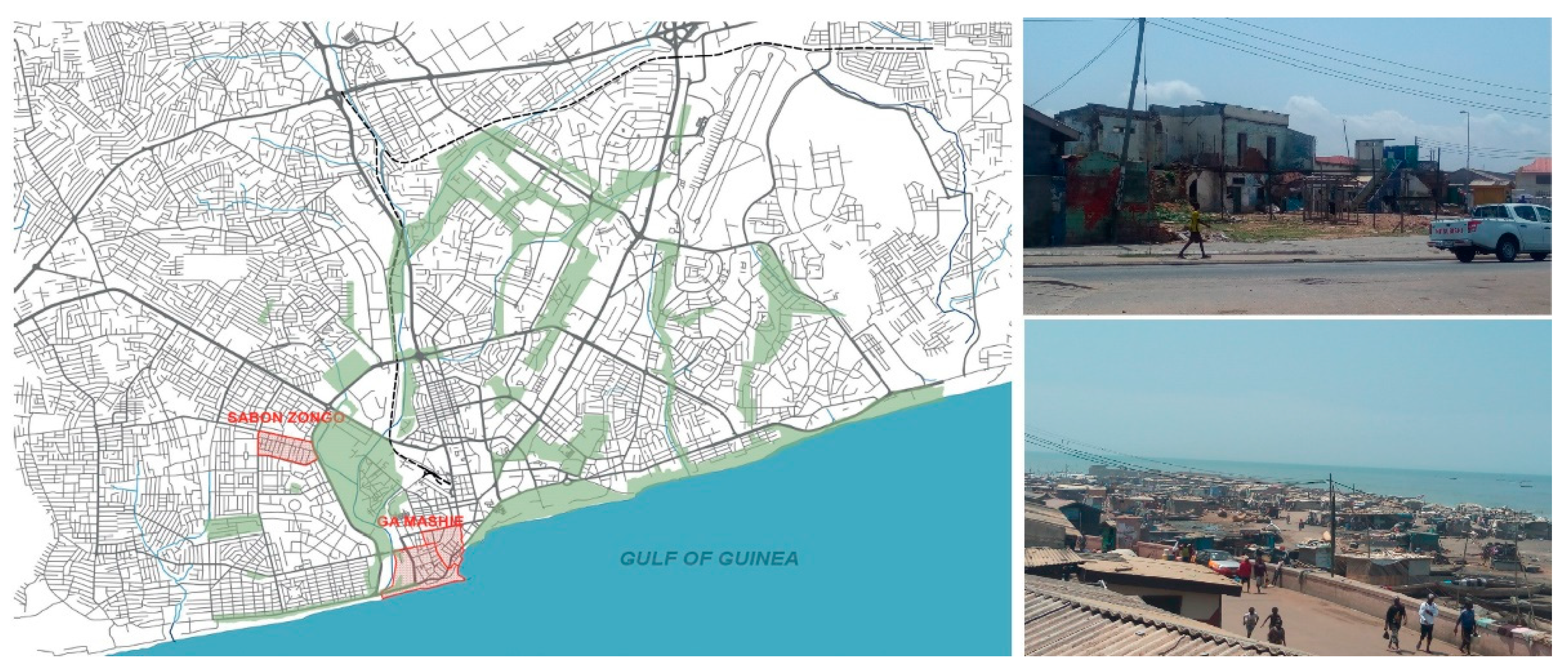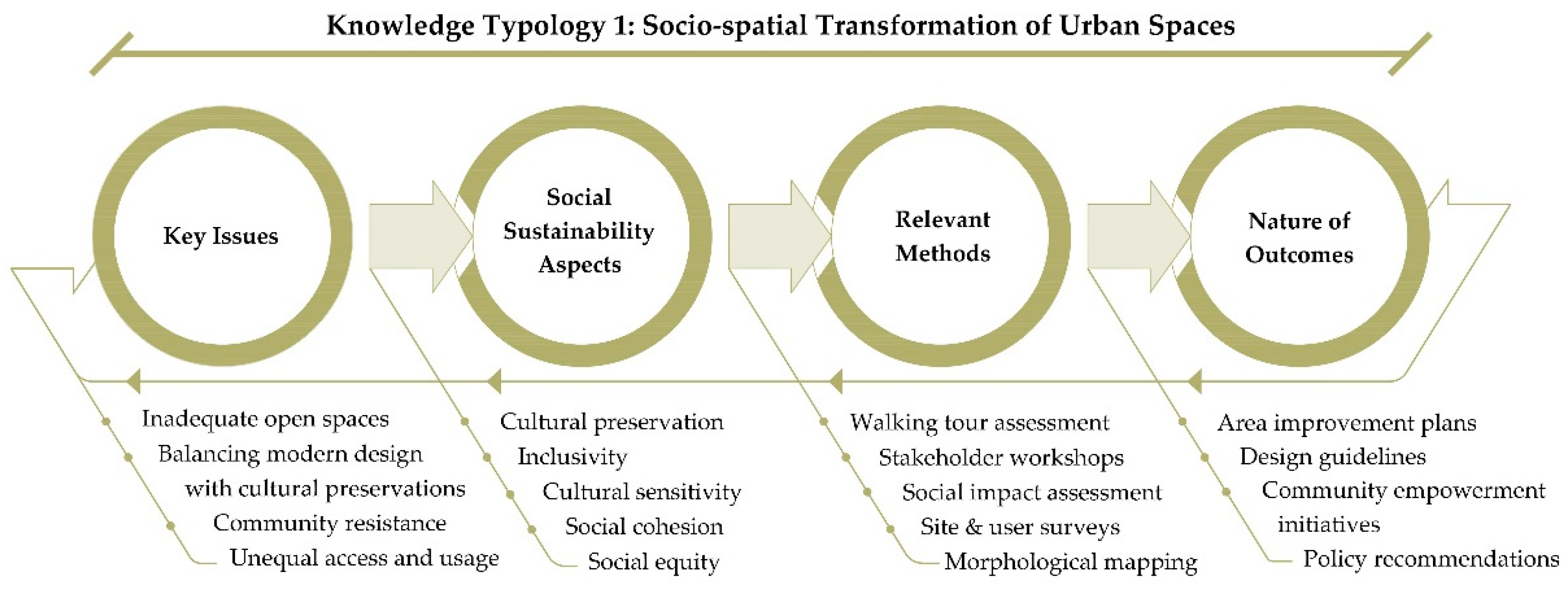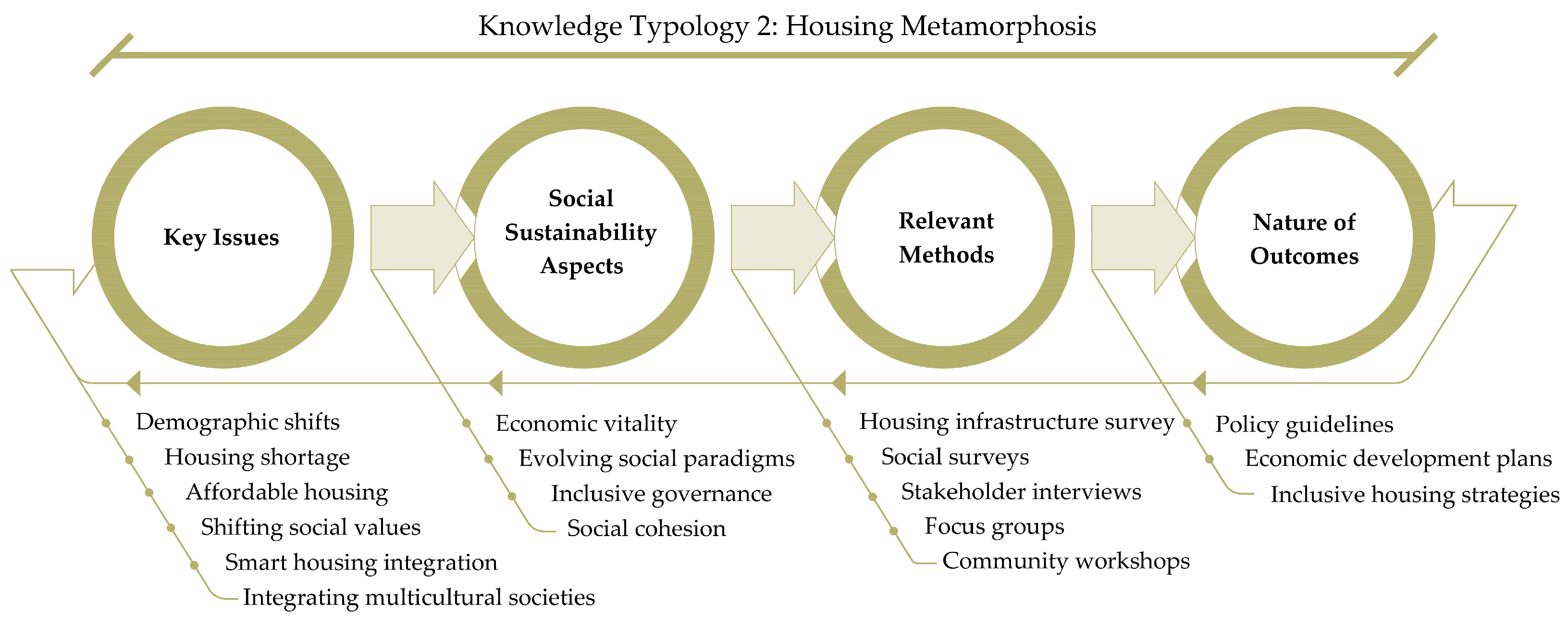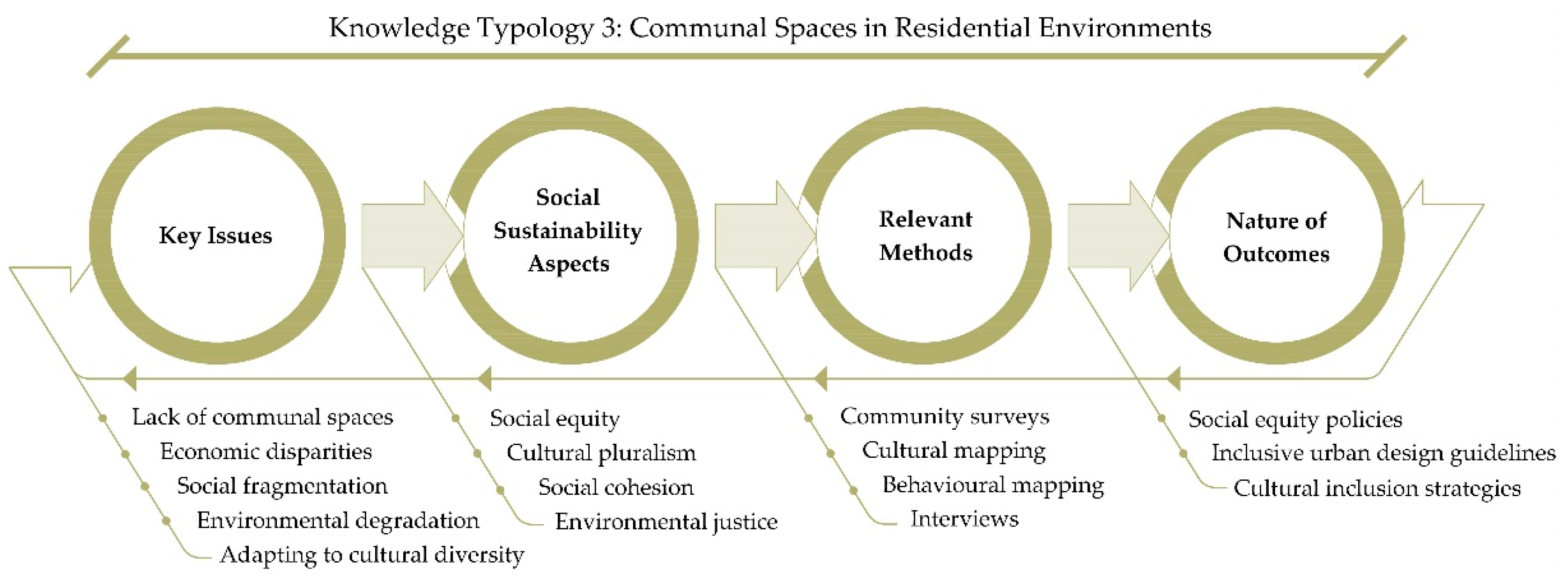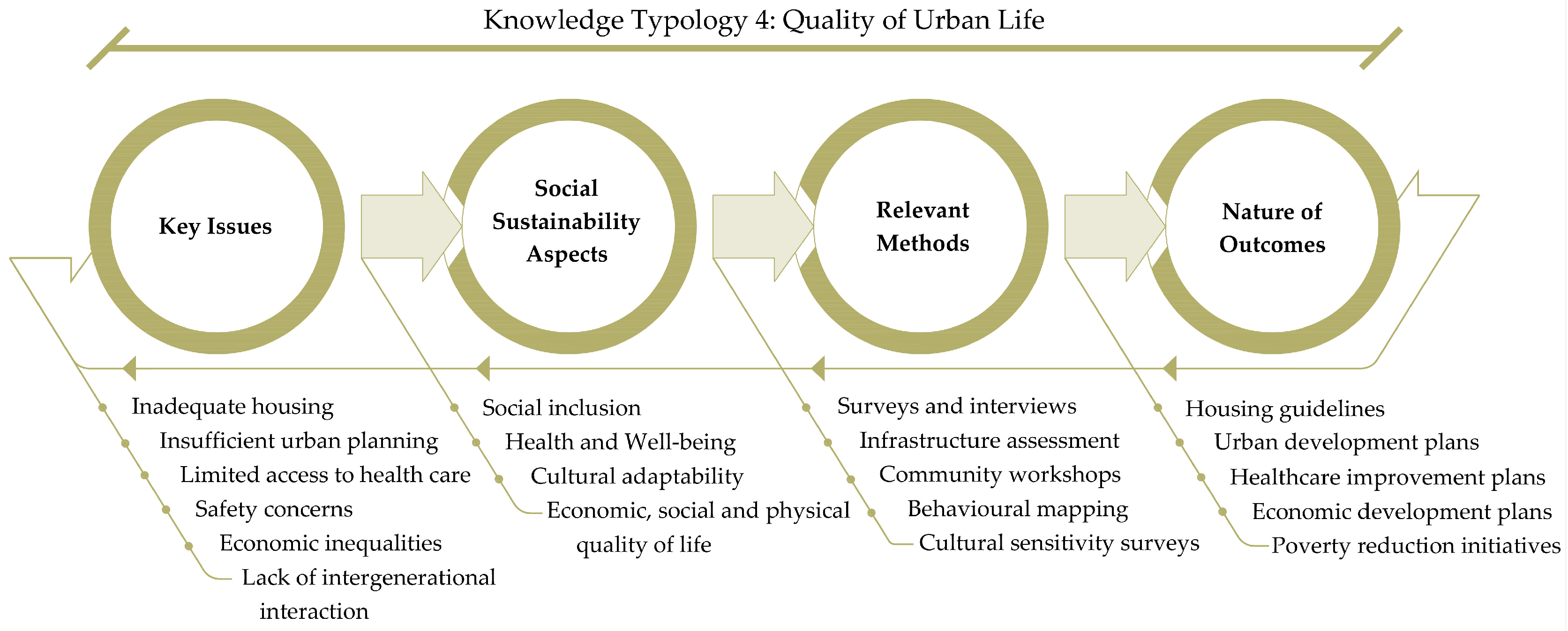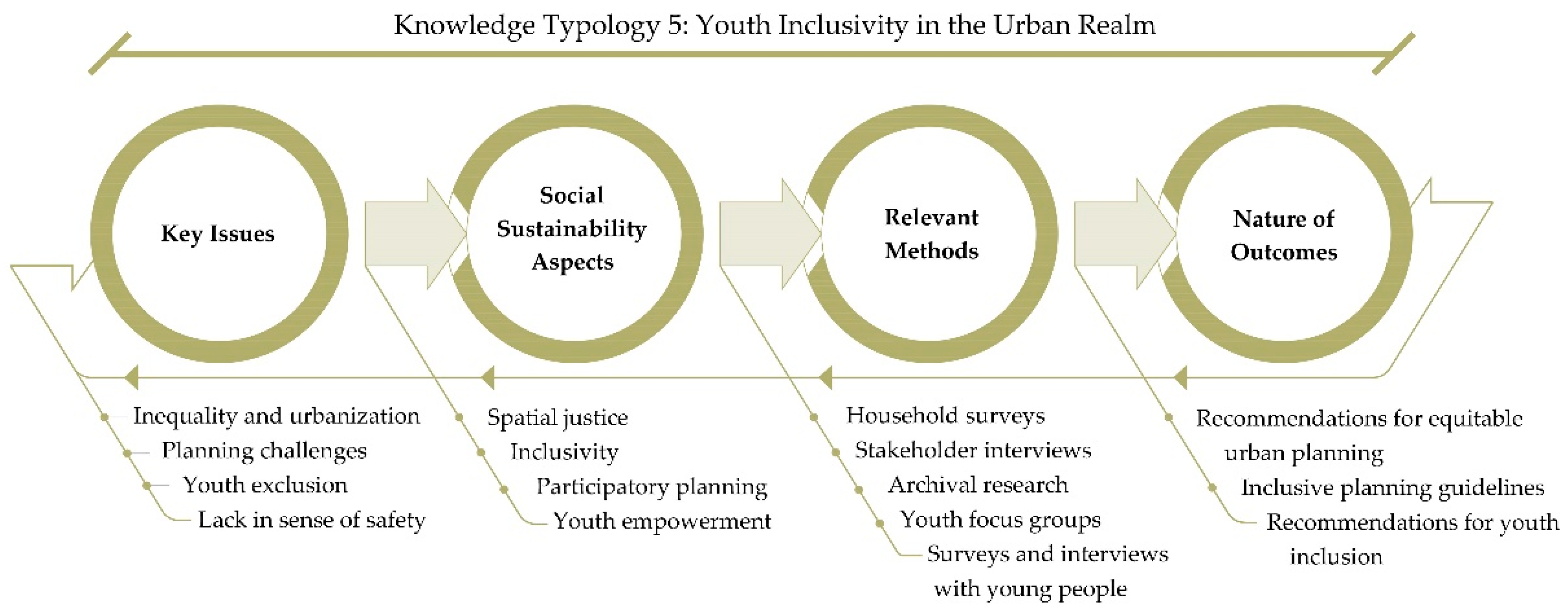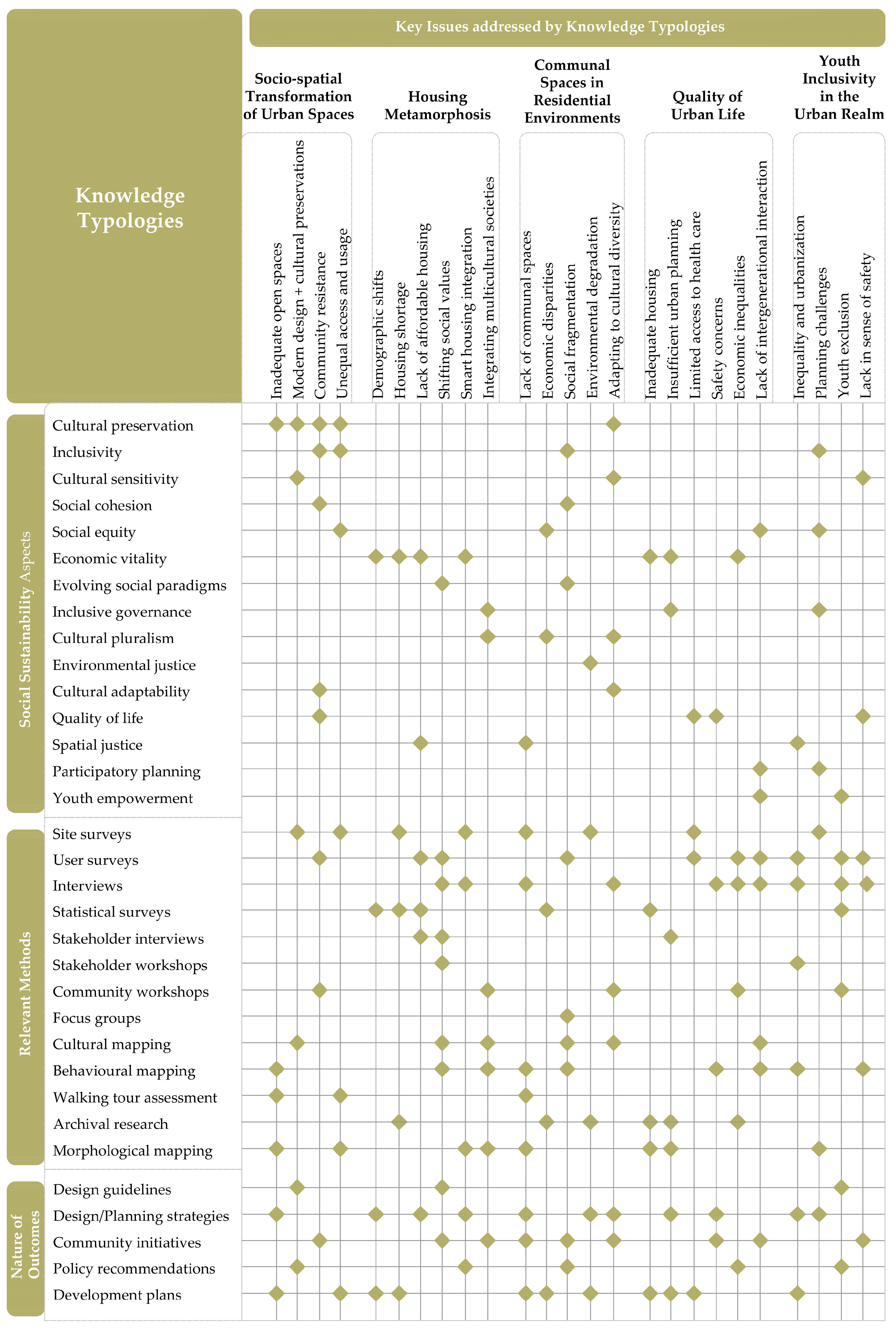1. Introduction: A Prelude to People-Place Narratives (PPN) and Social Sustainability
In the intricate tapestry of urban life, the nexus between individuals and their environments forms the heartbeat of a city. This is particularly evident in the Global South which is undergoing a multitude of influences, with architecture and urbanism witnessing significant transformations that raise critical questions about urban growth, sustainable development, city regeneration, retrofitting, quality of urban life, health, livability, identity, and multiculturalism. In various areas of the Global South, the development of urban environments takes place alongside challenges of environmental degradation, ethnic and regional conflicts, mass displacement of refugees, political and economic instability, and other harsh realities. As the Global South grapples with distinctive urban challenges and development trajectories [
1,
2], the imperative of research on social sustainability as it relates to people and place becomes increasingly palpable. Therefore, this study aims to unravel the complexities of social sustainability and aims to offer fresh insights into the dynamics of urban development.
Urban literature has traditionally addressed the multifaceted concept of social sustainability. However, a notable gap exists in understanding its dynamic nature, particularly emphasizing social equity and community sustainability [
3,
4,
5,
6]. Thus, the investigation seeks to bridge this void by examining the complexities of social sustainability while offering a nuanced perspective that centers around two key dimensions: social equity and community sustainability [
7,
8,
9,
10]. In doing so, the study establishes a fresh lens through which complexities often overlooked in conventional analyses of the built environment can be unraveled.
In the broader context of sustainable development, where environmental and economic dimensions have received considerable attention since the seminal 1987 Brundtland Report [
5], this study focuses exclusively on the social dimension, exploring the evolving concept of urban social sustainability. This focused exploration serves as a crucial link between the global pursuit of sustainable development and the specific emphasis on the social fabric within the unique contexts of the Global South. Fundamental questions that unravel the layers of social sustainability within the urban tapestry of the Global South are raised including How do social equity and community sustainability manifest in diverse urban contexts? What unique insights can be gained from the narratives of people and their environments in cities like Alexandria, Tripoli, Basra, Lilongwe, and Accra? Focusing on this these questions, the thrust of the paper is to demonstrate the potential for positive change in selected cities of the Global South.
The immense potential held within the development of knowledge typologies is recognized [
11]. These typologies, conceived as conceptual frameworks, offer a structured approach to categorize and understand the multifaceted knowledge emerging from People-Place Narratives (PPN). Distinct typologies for each city—Alexandria (
Egypt), Tripoli (
Libya), Basra (
Iraq), Lilongwe (
Malawi), and Accra (
Ghana) are developed. Hence, the study not only aims to uncover unique patterns and trends shaping urban social sustainability of the selected urban contexts. It also endeavors to provide tools for informed decision-making, policy formulation, and academic discourse [
12,
13,
14,
15,
16]. Notably, the establishment of knowledge typologies has the prospect of contributing to the academic understanding of social sustainability while serving as a valuable resource for stakeholders engaged in shaping urban environments in the Global South. This recognition underscores the transformative potential of knowledge typologies in guiding possible interventions and fostering a more sustainable and equitable urban future.
Central to this investigation is the line of inquiry employed to capture the essence of People-Place Narratives (PPN) in each of the five cities. A qualitative approach is adopted, incorporating a mix of attitude surveys, in-depth interviews, focus group discussions, participatory observations, and behavioral and navigational mapping. Engaging directly with residents, community leaders, and other stakeholders in each city, the paper extracts nuanced narratives that elucidate the lived experiences, perceptions, and values of individuals within specific locales. This approach goes beyond quantitative indicators, uncovering intangible aspects that contribute to a sense of belonging, community well-being, and social equity as pillars of social sustainability.
A structured approach (
Figure 1) to respond to the questions is followed. Firstly, the investigation delves into the challenges and theoretical foundations of social sustainability within the Global South. Subsequently, each case study is scrutinized to uncover distinct knowledge typologies unique each case. Finally, synthesizing these typologies to form the basis for informed decision-making, policy formulation, and academic discourse, offering a roadmap for sustainable urban development. This structured approach contributes to academic knowledge and offer practical insights for stakeholders involved in shaping the urban landscape of cities in the Global South.
2. Perspectives on Social Sustainability
Social sustainability fosters equitable, just, and inclusive societies. It prioritizes the well-being of individuals and communities. It is grounded on recognizing the interplay among social, economic, and environmental dimensions, and aims to nurture resilient communities [
7,
8,
9,
10,
14]. At its core lies a commitment to social justice and equity, aiming to diminish disparities and ensure equal access to opportunities and resources for all members of society [
9]. As a paradigm, social sustainability emphasizes community engagement and participation, valuing local knowledge and empowering individuals and communities in decision-making processes [
17]. Cultural diversity and inclusivity are integral to valuing and preserving diverse cultural identities to shape community bonds [
18]. Concerned with the quality of life for present and future generations, social sustainability encompasses diverse aspects including health, education, social cohesion, and the overall well-being of individuals and communities [
1,
19].
Advocates for ethical governance and responsible leadership social sustainability emphasizes transparent and accountable decision-making [
20]. It typically adopts an approach that recognizes the interconnectedness of social, economic, and environmental systems, aligning with the idea that sustainable development necessitates a balanced consideration of these three dimensions [
21]. In essence, social sustainability strives to create communities that endure and thrive while embracing diversity, justice, and the well-being of all members of society.
The transition from global perspectives to a focused examination of the Global South is undertaken towards a cohesive narrative, allowing exploration of how the overarching principles manifest in the unique challenges and opportunities faced by the selected contexts as representative cases from the Global South.
2.1. Manifestations of Social Sustainability in the Built Environment
Achieving social sustainability within urban environments has been portrayed in the literature as a multidimensional endeavor that hinges on a comprehensive strategy which incorporates principles advocated by various scholars in the field. Equitable urban planning, highlighted by Rydin [
22], goes beyond conventional paradigms by ensuring that resources and opportunities are distributed proportionately among neighborhoods and diverse social groups. Addressing issues of justice and fairness this focus lays the foundation for a socially sustainable urban landscape. Moreover, creating inclusive public spaces, emphasized by Carmona [
23], is crucial in fostering social sustainability. Carefully developed urban spaces aim to promote socialization and unite diverse communities while serving as inclusive centers for residents of all backgrounds. In parallel, mixed-use development, a concept proposed by Ewing et al. [
24], integrates residential, commercial, and recreational spaces within neighborhoods to support walkability and mitigate commuting and thus contributing to a vibrant and interconnected community.
According to Squires and Kubrin [
25], affordable housing is critical to socially sustainable cities. This principle prioritizes secure and stable living conditions to prevent displacement and promote social equity within urban populations [
26]. Cultural preservation, as underscored by Wang [
27], signifies the commitment of urban decision making to social sustainability, acknowledging the significance of diverse identities and histories while fostering a profound sense of belonging and cultural continuity. Amalgamating these principles suggests that cities should strive towards achieving holistic social sustainability, going beyond merely meeting the functional needs of urban inhabitants. It involves cultivating a sense of community, inclusivity, and cultural diversity. Understanding the interconnected nature of these principles contributes to creating enduring and thriving urban communities.
2.2. Research Approaches to Urban Social Sustainability
Research in urban social sustainability employs various methodologies, reflecting a nuanced understanding of the challenges and opportunities contemporary cities are encountering. Social Network Analysis has been discussed as an emerging methodological approach, enabling researchers to unravel the dynamics of social interactions in urban spaces, as highlighted by Carmona [
28]. This approach delves into the patterns and structures that shape the social fabric and provides important insights for fostering community building and social cohesion. Complementing this, Participatory Action Research, advocated by Reason and Bradbury [
29], places community engagement at its core. By involving residents in urban development projects, this approach ensures that their perspectives and needs play a central role, fostering inclusivity and creating urban spaces that resonate with the diverse voices [
30]. Urban ecology studies, exemplified by the work of Grimm et al. [
31], have been discussed as investigations of the interdependence of social and ecological systems in urban environments. Understanding how changes in the built environment impact human well-being and environmental sustainability inform strategies for fostering harmony between these interrelated aspects, and arguably, this ecological lens contributes to a holistic approach to urban development.
The intersection of technology and urban environments has been described as a dynamic focus in research on smart cities, as Caragliu et al. outlined [
32]. Investigating how smart city initiatives enhance social sustainability through technological interventions, researchers aim to improve connectivity, accessibility, and public service delivery. This tech-driven approach seeks to create urban environments that are not only technologically advanced but also socially inclusive, aligning with the broader goals of social sustainability.
The preceding research approaches are typically coupled with data collection tools brought to urban studies from the field of environmental psychology, including cognitive and navigational mapping, analysis of settings and systematic observations. These diverse research avenues collectively contribute to a comprehensive understanding of urban social sustainability and span examination of social interactions, community engagement, and the complex interplay between human well-being and the environment. However, strategic developments in research approaches and methodologies are imperative to fortify these endeavors and address potential gaps, especially from a people-place perspective.
2.3. The Case for Urban Social Sustainability in the Global South
There have been significant studies that have attempted to examine sustainability at various scales in the Global South. An overview of selected studies conducted in various regions sets the stage for developing the case for understanding urban social sustainability in the identified five urban contexts.
The pursuit of urban social sustainability in the Middle East is marked by unique regional challenges that necessitate carefully considering cultural, social, and historical factors. The contributions of various studies in this field offer profound insights into the complexities of urban development in the Middle East and highlight the need for adaptable, culturally sensitive, and community-focused strategies to achieve sustainable urban environments. The discourse on urban social sustainability in the Middle East has increasingly focused on the impacts of globalization and migration. Researchers have explored the complexities of Doha's urban environment [
33,
34], highlighting how efficient urban structures, spatial practices, and inhabitant identification play crucial roles in fostering social equity. Their work emphasizes the importance of designing urban systems that adapt to uncertainties, an essential component for achieving sustainable urbanism in rapidly evolving cities. Similarly, studying social sustainability indicators in the UAE, specifically focusing on Al Ain neighborhoods [
35,
36], sheds light on key elements such as vitality, social interactions, open spaces, pedestrianization, and cycling. This underlines the importance of creating a healthy and safe environment and stresses that regional and socio-cultural characteristics must be considered when aiming for socially sustainable neighborhoods. The resulting findings resonate with broader regional challenges in achieving social sustainability, particularly issues about community cohesion, social interaction, and the design of neighborhood spaces.
Significant contributions of scholars like Chiu [
6], Dempsey et al. [
10], and McKenzie [
37] have reinforced the idea that community cohesion is a critical dimension for socially sustainable neighborhoods. Their research echoes the need for urban spaces to promote social bonds and community well-being. In Iraq, studies by Al-hinkawi and Hassan [
38] provide an insightful perspective on the role of heritage in sustaining social identity. They argue that maintaining the visual continuity of heritage elements in urban design contributes significantly to social sustainability, a viewpoint that aligns with the Iraqi government's recent efforts to embed the principles of sustainability, justice, and good governance in its urban planning policies.
Social sustainability in the Chinese context is an evolving concept which is deeply rooted in the country's rapid economic transformation and urbanization processes. The core of social sustainability in China revolves around addressing issues such as income disparity, housing affordability, and the integration of migrant populations into urban societies. Additionally, it involves ensuring access to essential services like education, healthcare, and public transportation, which are critical for sustaining the socio-economic fabric of rapidly growing cities. Scholars like Fulong Wu [
39] have extensively explored these themes, highlighting the unique challenges posed by the hukou (household registration) system, which impacts the social rights and welfare of millions of rural-to-urban migrants. This system creates a dichotomy within urban societies, leading to challenges in achieving social equity and inclusion.
Furthermore, the balancing act of advancing economic development while preserving cultural heritage and ensuring environmental sustainability forms a crucial aspect of the broader sustainability discourse in China [
40,
41]. Efforts to create sustainable urban environments are not only focused on green infrastructure but also on maintaining social stability and cultural identity. The Chinese government's initiatives, such as the “eco-city” concept, aim to model urban development that is sustainable in both environmental and social terms. However, as scholars like Ya Ping Wang have noted, the success of these initiatives depends significantly on their ability to respond to the diverse needs and values of local communities [
41]. Addressing the social implications of rapid urbanization, such as the loss of community ties and traditional lifestyles, is vital in ensuring that the pursuit of sustainability echoes the cultural and social realities of the Chinese society [
42]. Thus, social sustainability in China encapsulates a comprehensive approach that seeks to harmonize economic growth, environmental protection, and social equity.
In the Indian context, social sustainability is deeply intertwined with the country's rapid urbanization and economic development. India faces a unique set of challenges in its pursuit of social sustainability, particularly within its urban landscapes [
43,
44]. Indian cities are experiencing unprecedented growth and grappling with issues such as inadequate housing, escalating social inequalities, and limited access to essential services like healthcare and education. The analysis of the situation brings to light the complexities of these urban challenges while emphasizing the need for comprehensive strategies that prioritize equitable development, inclusivity, and the enhancement of quality of life for all urban residents [
43,
45]. It is argued that sustainable urban development in India must transcend economic and environmental considerations to deeply incorporate social dimensions and ensure that the benefits of urban growth are equitably distributed across all strata of society. Advancing this discourse, Annapurna Shaw's extensive work on urban sustainability in India, highlights the importance of integrating local cultural and community values within the framework of urban development [
46]. Shaw asserts that social sustainability cannot be achieved without recognizing and valuing the diversity of its cultural and social fabric. Her research points to the necessity of participatory governance and community engagement in urban planning processes.
In South America, social sustainability is particularly relevant and complex, given the diverse socio-economic and cultural landscape that this continent enjoys. Research points out that social sustainability in South America is not just about improving economic conditions, but also about fostering social inclusion, enhancing access to essential services, and ensuring participatory governance [
7]. Several studies underscore the importance of adopting a holistic approach that considers the varying needs of diverse urban populations, including marginalized and indigenous communities. Through their extensive research Alejandro Portes and Bryan Roberts [
47] further expand on these themes. Their studies focus on how urbanization in Latin American cities has led to unique forms of social stratification and spatial segregation, affecting the social fabric of many cities. Portes and Roberts underline the critical role of urban policy in promoting equitable access to housing, education, and employment opportunities. They argue that addressing the challenges of urban poverty and inequality is crucial for the social sustainability of cities in South America. Their research sheds light on the need for community-driven development initiatives that empower local populations and enable them to actively participate in shaping their urban environments [
48,
49].
Addressing various contexts in the Global South the preceding analysis highlights that the path to social sustainability lies in embracing each region's cultural uniqueness. This includes socially focused housing design and development, user-centric public spaces that cater to diverse populations, engaging communities in decision making, and formulating policies that are equitable, inclusive, and responsive to the needs of all urban residents.
3. A Methodological Approach for Developing People-Place Narratives (PPN)
People-Place Narratives (PPN) are operationally defined as the stories, experiences, and meanings associated with a particular location or space as perceived and shared by those who inhabit or interact with that place. These narratives go beyond the physical attributes of a space and encompass emotional, cultural, and social connections people develop in relation to their surroundings. People-place narratives include subjective, personal accounts capturing emotional dimensions of a location or a setting. They intertwine everyday stories and contribute to our understanding of personalization and the development of a sense of identity where memory and attachment play a key role. Beyond individual experiences, community stories shape collective identity and belonging, and transformative events influence a location's narrative and my enable the shaping of a collective memory.
The approach to developing PPN in the Global South involves a comprehensive analysis of aspects of social sustainability within diverse urban contexts. The analysis unfolds through examining five distinct cases: Alexandria (Egypt), Tripoli (Libya), Basra (Iraq), Lilongwe (Malawi), and Accra (Ghana), each of which was a topic for a PhD investigation supervised by the lead author. The structured exploration encompasses narratives that include histories, urban transformations, and lived experiences, contributing valuable insights to the broader discourse on urban development and sustainability in the Global South. Through an examination of contextual challenges, theoretical foundations, and research methodologies adopted in each case, the approach aims to reveal the complex dynamics shaping social sustainability and form a distinct knowledge typology for each context. Within the milieu of urban environments across the Global South, the interwoven narratives of people, places, and sustainability form a complex scene that reflects the nature of societal development. The five cases identified are outlined as follows:
Case 1: Transformations in the Urban Waterfront of Alexandria, Egypt: This case addresses the Eastern Harbor waterfront of Alexandria where the quality and efficiency of transformed public spaces are examined. By weaving historical contexts with contemporary initiatives, the case unveils the profound impact of European planning on the city's present state. Lingering echoes of Mohamed Ali's 19th-century vision together with successive developments over the 20
th and 21
st centuries catalyze significant urban transformations which prompt critical reassessment and questioning of the current state of these spaces [
12].
Case 2: Housing Transformations in Tripoli, Libya: This case captures an overview of transformations in North Africa with a particular focus on Tripoli. The case offers an investigation that unfolds housing formation and transformation. Beyond physical changes, it critically examines the impact on social structures, individual preferences, and cultural identities. This holistic examination aims to inform future housing policies while emphasizing the need for a harmonious integration of contemporary solutions into cultural identity [
13].
Case 3: Communal Space in the Urban Dwellings of Basra, Iraq: This case unravels the fabric of social sustainability within single-family house neighborhoods in Basra. The case delves into critical concepts, indicators, and determinants of social sustainability. It contributes to elucidating social interaction patterns and the role of the built environment in shaping this interaction while providing valuable insights for urban design systems in the city [
14].
Case 4: The Quality of Urban Life in Lilongwe, Malawi: This case examines the historical trajectory and contemporary challenges in Lilongwe. The case identifies crucial knowledge gaps and proposes a comprehensive context-specific quality of urban Life model (QoUL). Through a multi-layered methodological investigation of selected residential areas, the case offers an effective validation of QoUL indicators and provides practical guidance for enhancing residents' perceived quality of life from a comparative perspective [
15].
Case 5: Youth Inclusivity in Public Spaces, Accra, Ghana: This case confronts the pervasive spatial marginalization of young people within the urban landscape in Accra. The case responds to critical knowledge gaps through a spatial justice lens and offers insights into youth experiences in Accra's public spaces. It proposes guidance for urban policies and designs that prioritize inclusivity and equity in African cities [
16].
Following a structured approach to analysis (
Figure 2), each of the five cases is systematically analyzed through a number of categories that include contextualization, objectives, social sustainability issues, theoretical foundations, research methodologies and key findings. The analysis culminates with synthesizing findings and identifying key themes, forming a distinct knowledge typology for each case.
4. Case 1: Transformations in the Urban Waterfront of Alexandria, Egypt
In this study, social sustainability of public spaces along Alexandria's Eastern Harbor waterfront was evaluated, integrating historical evolution with contemporary initiatives. Using a people-place narrative approach, the research aimed to understand and inform the future development of Mediterranean urban spaces with a focus on Alexandria [
12].
Historic waterfront squares at the heart of Alexandria's city center are marked by their architectural significance (
Figure 3). The have evolved with the city's socioeconomic transformations. Reflecting a blend of Mediterranean and European influences, these spaces had been significantly shaped by Mohamed Ali's 19th-century vision. From its status as Egypt's second capital during the British occupation to the introduction of recent public space developments, Alexandria's urban fabric reflected a complex history of transformation and European influences. However, concerns had arisen highlighting the underutilization and neglect of these areas, pointing to a critical need for reassessment and improvement. At the core of the study was the concept of social sustainability, viewed through the lens of historical significance and the evolving relationship between residents and their urban spaces. The research promoted user-centric and inclusive public space assessment, emphasizing the importance of cultural preservation and community engagement for fostering social cohesion and well-being. It was posited that understanding the influence of the built form on community bonds and social life was crucial for maintaining resilient and adaptable public spaces.
The theoretical framework combined Hall's Proxemics Theory [
50,
51], Gibson's Affordance Theory [
52], Place Attachment Theory [
53], and the work of other scholars [
54,
55,
56,
57] to examine how spatial relationships, physical qualities, and emotional bonds shaped interactions within urban spaces. These theories collectively provided insights into how cultural and historical elements contributed to the social and spatial dynamics of urban environments.
Methodologically, the study employed a multi-layered approach which involved spatial and social analyses of selected public spaces. This included morphological examinations, user surveys, observations, and expert opinions to dissect the user experience of transformed spaces. The methodology prioritized a holistic perspective with the aim of capturing Alexandria's waterfront's multifaceted challenges and potentials.
Findings revealed the necessity of creating inclusive, user-centric public spaces that reflected the community's diverse needs and cultural heritage. The study underscored the importance of community engagement, safety, security, and adaptability in designing socially sustainable urban spaces. These elements are conceived to contribute to a sense of place identity and community well-being, advocating for a continuous evaluation and improvement process. The study offered a detailed understanding of Alexandria's waterfront public spaces through a social sustainability perspective. It highlighted the need for informed and inclusive urban development, emphasizing the role of historical context, design quality, community engagement, and adaptability in shaping the future of these vital urban areas. As a knowledge typology, the study contributes to a broader "socio-spatial transformation of urban spaces”, which provides important insights for enhancing urban open spaces and waterfronts.
4. Case 2: Housing Transformations in Tripoli, Libya
This research explored the factors of formation and causes of transformation of housing in North African cities with a focus on Tripoli. It aimed to understand the dissension between modern housing solutions and rich cultural heritages, particularly the shift from traditional courtyard houses to apartment buildings and later to social housing. The study critically examined the profound impact on social structures, preferences, and the broader urban fabric at both macro and micro levels, integrating a people-place narrative to explore the interplay between physical environment and social life [
13,
58].
The research sought to construct a comprehensive knowledge framework. It addresses a critical gap by offering a holistic view of housing transformation. The study scrutinized the physical alterations in architectural forms and the socio-cultural dynamics underpinning these changes. The insights aimed to inform future housing policies while promoting a harmonious integration of contemporary solutions which speak to historical and cultural identity. Navigating the concept of social sustainability, the study revealed notable inadequacies in housing strategies across Libya, Tunisia, and Morocco, particularly in meeting socio-cultural needs. It highlighted the conflict between modern housing programs and cultural preservation, exacerbated by the tidal waves of globalization. Emphasizing the historical significance of traditional courtyard houses, the study advocated for housing policies developed with cultural sensitivity, enhancing community bonds and well-being.
The theoretical underpinnings included a multidisciplinary approach which incorporates insights from architecture, sociology, psychology, and cultural studies. Recognizing housing as a holistic entity, the study extended to environmental psychology and emphasized the need for decentralized administration and user empowerment in housing design [
30,
59,
60,
61]. Integrating these theories with social sustainability principles the study underscored the importance of cultural values, community dynamics, and individual well-being in housing development. Methodologically, the study employed an iterative data analysis through an inductive approach. Premised on grounded theory, this allowed for understanding housing transformations by examining traditional and modern housing typologies in Tripoli (
Figure 4). The research method involved detailed comparative analyses at urban and architectural scales, alongside interviews with decision-makers, architects, and users to explore socio-cultural norms and users' perspectives on housing and preferences related to various housing typologies [
13]. Reflecting on the findings, the research first identified key factors that formed traditional medinas and the main drivers for the transformation process. The complexity of transformation in housing necessitated investigating the subject from different perspectives and at various levels. On the one hand, physical aspects were investigated through analyzing various traditional housing units from the three medinas of Tripoli, Tunis, and Fez, and non-traditional housing units from Tripoli [
13]. On the other hand, social aspects associated with housing transformation were analyzed through investigating the meaning and use of spaces within the housing units from the users’ viewpoint, and housing strategies and design from the decision-makers and professional architects’ perspectives.
By and large, the research provided valuable insights into the intricate relationship between housing transformation, people-place narratives, and social sustainability in North African cities, offering a profound understanding of the complexities involved in developing culturally sensitive and sustainable housing policies. As knowledge typology, this study can be represented by a conceptual framework that encapsulates the multifaceted dimensions and stages of “housing metamorphosis”. This typology serves as a structured tool to systematically analyze and categorize housing transformations, considering the evolution of architectural forms, socio-cultural shifts, and urban growth.
5. Case 3: Communal Spaces in the Urban Dwellings of Basra, Iraq
This research investigated aspects of social sustainability of residential neighborhoods in Basra, Iraq. It placed emphasis on Single-Family House Neighborhoods (SFHNs) (
Figure 5). It aimed to reveal the concepts, indicators, and determinants of social sustainability, understand local social interactions, scrutinize communal spaces in SFHNs, and propose improvements to Basra's urban design systems. The study contributes to international literature on Middle Eastern city planning, addressing critical issues like housing crises, urban development, social interaction decline, planning deficiencies, and cultural transformations [
14].
The exploration of social sustainability in Basra's SFHNs unveiled pressing concerns. Rapid urban development had exacerbated housing crises, impacting long-term neighborhood viability and community well-being. A significant issue identified was the lack of social interaction among residents, affecting community cohesion, sense of belonging, and the overall social fabric. The study emphasized the need to understand these dynamics for fostering vibrant, socially sustainable communities.
Urban planning deficiencies were highlighted as a critical challenge. Inefficient land use and limited access to communal spaces were viewed as impediments to social sustainability in SFHNs. Additionally, the research addressed the interplay of cultural and social transformations, advocating for urban planning that adapts to shifting norms while preserving cultural identity. Economic disparities, historical security concerns, and gender dynamics were recognized as further complexities in Basra's social sustainability landscape. These factors were regarded to influence community access to resources, safety, and the design and planning of neighborhoods to accommodate diverse gender roles [
7].
The theoretical framework of the study delved into the fundamental concepts and factors influencing social dynamics within communal spaces in SFHNs. It started with defining communal spaces and categorizing them based on scale, service, and design features. The research placed emphasis on physical characteristics of the built environment (PCBE) as they relate to social interaction and the associated demographic factors (DF). It incorporated various theories, including Gehl's typology [
62] and Social Sustainability Indicators (SSI) [
63], to understand the relationship between urban form, design, and social interaction.
Employing a mixed methods design, the methodology included semi-structured interviews, questionnaires, observation, behavioral mapping, and site surveys. This approach provided a comprehensive understanding of the factors influencing social interaction in SFHNs. The research design emphasized the importance of rigorous testing of methods and procedures to ensure the validity of the approach and the findings. The research concluded that neighborhoods continued to play a critical role from a social perspective, with the Interactional Space Index revealing key communal spaces for gatherings in Basra's SFHNs [
14]. The study differentiated between intentional and unintentional spaces, noting how each type catered to various types of social interaction. Climatic conditions, design quality, proximity, as well as cultural norms and socioeconomic shifts were identified as influencing factors for residents' socio-spatial practices. Urban design deficiencies in Basra's SFHNs were highlighted, alongside dissatisfaction with public services and misalignments with socio-cultural needs.
Overall, the research offered an examination of social sustainability in Basra's SFHNs, elucidating insights into local interactions, communal spaces, and urban planning. Advocating for people-place narratives and culturally sensitive designs to enhance community well-being, an adaptable "communal spaces in residential environments” knowledge typology emerges to provide guidance for improving social sustainability in urban housing.
6. Case 4: The Quality of Urban Life in Lilongwe, Malawi
This research delved into Lilongwe, Malawi's capital, to explore the quality of urban life (QoUL) using an ethnographic approach. It traced Lilongwe's evolution from a modern town influenced by a strong colonial presence to a bustling administrative center. Post-independence in 1964, the city faced a series of significant challenges including population growth, housing inadequacies, and financial deficits [
15,
64]. The study aimed to fill knowledge gaps by proposing a QoUL model, identifying critical indicators within the context of Lilongwe, and providing guidance to enhance residents' perceived quality of life.
Navigating the realm of social sustainability, the study painted a people-centric narrative of Lilongwe, emphasizing the city's multidimensional urban landscape (
Figure 6). The narrative portrayed streets as vital community connectors and highlighted the importance of designing neighborhoods to cater to the needs of children and youth, underscoring the city's commitment to its future. Economic sustainability was intertwined with local neighborhood vibrancy, illustrating homes as anchors of stability and community. Health and well-being were also key themes where the research advocated for improved healthcare services and safer neighborhoods [
15,
65].
The theoretical tapestry of the research was comprehensive advocating for a multidimensional understanding of QoUL. It highlighted the importance of considering the physical, social, economic, and well-being domains of urban life. The study recognized the need for a nuanced approach to geographic scales, the temporal evolution of urban spaces, the subjective nature of QoUL, and the cultural impact on quality of life [
15,
66]. Combining objective and subjective dimensions, the study called for a balance of traditional economic indicators such as employment rates and household incomes, and indicators with personal measures such as happiness and satisfaction.
Methodologically, the research employed a residential attitude survey, carefully designed, and validated based on QoUL literature [
15,
67]. The survey covered demographic details and explored four pivotal QoUL domains using a Likert scale. Fieldwork in selected neighborhoods gathered both qualitative and quantitative data on residents' perspectives. Ethical considerations were paramount, ensuring participant anonymity and confidentiality. Mobile Virtual Reality (VR) and collaboration with a local colleague addressed practical limitations and cultural sensitivities. The findings from the study revealed a strong sense of community and satisfaction among residents in Lilongwe's neighborhoods. The social dimension of the quality of urban life was notably high, with areas exhibiting particularly strong neighborhood relationships. Economically, the research identified disparities in work opportunities, tenure, and education across the three examined neighborhoods, calling for targeted interventions. Well-being was generally positive with specific concerns about urban safety and healthcare facilities in certain neighborhoods [
15].
The research accentuated the need for neighborhoods-specific strategies to enhance Lilongwe's overall quality of life. Residents advocated for improved social public spaces, especially for youth and children. The insights from the study contribute to establishing the “quality of urban life” knowledge typology which serves as a comprehensive tool for urban planners, policymakers, and researchers to address the complexities of urban life and promote social sustainability through people-place narratives in Lilongwe and similar contexts in Malawi and beyond.
7. Case 5: Youth Inclusivity in Public Spaces, Accra, Ghana
This research explored the spatial marginalization of young people in Accra’s urban landscape through a spatial justice lens. It aimed to understand youth experiences in public spaces in African cities, addressing knowledge gaps concerning contemporary African urbanism, rapid urbanization, historical planning legacies, and persistent inequalities [
16]. The study was anchored in Lefebvre's spatial triad—conceived, perceived, and lived spaces [
68] —to analyze the effects of spatial planning, youth policies, and local power dynamics on the perceptions and utilization of public spaces by Accra's youth.
Exploring aspects of social sustainability in Accra highlighted the critical challenges of inequality, rapid urbanization, and historical planning practices. These challenges perpetuated socioeconomic divides, with young people often excluded from vital aspects of urban life. The study advocated for inclusive planning, emphasizing the right to the city for all citizens while focusing on marginalized youth [
69].
The theoretical base of this study was centered on the dynamics of belonging and everyday politics in urban spaces. It employed Pfaff-Czarnecka's perspectives on belonging as a complex collective sociability shaped by shared practices, knowledge, and norms [
70]. The study also engaged with the politics of belonging, practices of exclusion and inclusion, and the everyday politics of resistance, support, and compliance. Henri Lefebvre's right to the city was a central concept that enabled scrutinizing various interpretations of rights and the power distribution within urban spaces.
Methodologically, the study adopted a multi-level approach, combining qualitative and quantitative methods for a comprehensive understanding of the issues in question. Participatory tools like informal conversations, auto-photography [
71], and cognitive mapping were used alongside systematic photographic observations and interviews with local authorities, traditional bodies, and youth representatives. Analysis of urban planning and policy documents provided an effective contextualization for the challenges encountered by the youth in public spaces. The research revealed the complexities and contrasting realities of youth experiences in Accra's public spaces, particularly in two very different residential areas: Ga Mashie and Sabon Zongo (
Figure 7). It uncovered the limited access to open spaces, the significant role of traditional or tribal leaders, and the cultural and religious dimensions shaping social networks and belonging. The study highlighted the pervasive theme of youth marginalization, with young people feeling disconnected, undervalued, and powerless. These led to opportunistic political engagement and contributed to a fragile democratic system. By and large, the study recognized the fragmented roles in governance and policy, with outdated legislation, funding deficiencies, and political interference hindering effective youth development [
16]. It called for more genuine and inclusive participation in urban development and emphasized the need for transformative efforts to address the challenges faced by Accra's youth.
In conclusion, the research provided a comprehensive understanding of the intersection of youth experiences, spatial planning, and marginalization in urban Accra. The research contributes to the discourse on social sustainability and people-place narratives, advocating for policies and urban designs prioritizing inclusivity and equity. Emerging from the research findings, the "youth inclusivity in the urban realm" knowledge typology serves as a structured framework for addressing the complexities of youth experiences in urban contexts, which offers guidance in policy formulation and interventions, and prioritizes young people’s inclusivity, well-being, and empowerment.
8. Discussion—Research Cases from the Global South as Knowledge Typologies
The term "knowledge typologies," derived from the concept of knowledge spaces [
11] emerged as critical frameworks for categorizing the diverse forms of knowledge that permeate our collective psyche in architecture and urbanism. The distinction between tacit and explicit knowledge lies at the heart of knowledge typologies.
Tacit knowledge is intuitive and unspoken, rooted in personal experiences and skills, making it challenging to express or document [
69]. This form of knowledge is explored in this paper through people-place narratives which highlights its subjective and context-specific nature. In contrast, explicit knowledge is well-structured and communicable form of knowledge and consists of facts and theories that can be verified and shared through language, symbols, and text, originating from empirical studies [
69]. The interaction between these two forms of knowledge is vital.
In academic inquiry, it is conceived that knowledge typologies are used to categorize different forms or domains of knowledge within a specific discipline, a study area or context, or a group of disciplines. Such typologies help researchers and scholars organize information, identify patterns, and develop conceptual frameworks for understanding the subject matter [
11]. The scrutiny and in-depth analysis of five distinct urban contexts have yielded key insights, which rise to five discernible knowledge typologies. The emergent typologies are captured in five types: the Socio-spatial transformation of urban spaces, housing metamorphosis, communal spaces in residential environments, quality of urban life, and youth inclusivity in urban realms. Each of these typologies involves key components and implications for a clear understanding of the relationship between the physical manifestation of social sustainability and the experiential reality.
8.1. Knowledge Typology 1: Socio-Spatial Transformation of Urban Spaces
The “Socio-spatial Transformation of Urban Spaces” knowledge typology is concerned with assessing the socio-spatial transformation of urban open spaces (
Figure 8). It represents a comprehensive framework that systematically captures critical aspects of this transformation process.
The typology recognizes that urban spaces often struggle between past and present, tradition and modernity. Inadequate open spaces, a pressing concern in many cities, are not just voids waiting to be filled; they represent the lungs of the city, areas where nature intersects with urban life, offering respite and recreation for all user groups. The challenge lies in integrating these spaces into the urban fabric without sacrificing the cultural narratives that give a place its unique character. Moreover, the resistance from communities to urban transformation projects is not a mere opposition to change but often a reaction to a history of exclusion and the anticipation of inequitable outcomes. This resistance calls for a more democratic and participatory approach to urban design and planning.
From the lens of social sustainability, the typology reflects the ethical imperatives of urban design. Cultural preservation goes beyond protecting buildings; it's about sustaining the living essence of a community's history and identity. Inclusivity, cultural sensitivity, social cohesion, and social equity are not just aspirational goals but are fundamental to the enduring vitality of urban spaces. These elements foster a sense of belonging and ownership among all residents and empower them to contribute to the city's evolving narrative.
The methods proposed by this typology are tools for translating these values into action. Walking tour assessment becomes a method for examining physical spaces and an experiential approach to engage with the stories and memories embedded in the urban landscape. Stakeholder workshops and social impact assessments are platforms for dialogue, ensuring diverse voices are heard and incorporated into future planning processes. Site surveys and morphological mapping provide a base of evidence to inform decisions, ensuring they are grounded in the realities of the urban environment.
This typology identifies the nature of the outcomes which include implementing area improvement plans and design guidelines that do more than beautify; they heal and weave together with the city's fabric. Community empowerment initiatives are seen as a catalyst for locals to become active agents in shaping their environment. Policy recommendations emerge as a blueprint for action, directing urban transformation towards a future that honors diversity, ensures accessibility, and celebrates the collective spirit.
In summary, this knowledge typology presents a narrative of transformation that is deeply attuned to the tempos of urban life. It calls for reimagining cities as ecosystems where every element is interconnected and where the measure of success is the well-being of its people and the sustainability of its communities.
8.2. Knowledge Typology 2: Housing Metamorphosis
The "Housing Metamorphosis” knowledge typology is a structured framework for understanding the dynamic elements of housing transformations (
Figure 9). The key issues involved in this typology include demographic shifts, changes in family structures, rise of ageing populations, and increasing diversity. All of which shape the need for a new kind of housing that socially and culturally responsive. This is compounded by the pressing reality of a housing shortage that leaves many without a place to call their own. The quest for affordable housing is a recurring theme, as it has become a key factor in pursuing a balanced and fair urban society. Integrating smart housing solutions presents an opportunity to enhance living conditions through technology, making homes not just spaces for living but hubs of connectivity, stability, and efficiency. Furthermore, integrating multicultural societies into the housing equation calls for recognizing diversity within the urban fabric and for creating neighborhoods that are a mosaic of cultures and communities.
The relevance of the preceding issues to social sustainability is evident and brings a broader perspective to the forefront. Economic viability is not just a fiscal matter but a cornerstone for sustainable housing solutions that must endure and adapt over time. The evolving social paradigms reflect collective ethos, and how homes are shaped must mirror the values of and aspirations for living harmoniously. Inclusive governance represents a progressive paradigm, ensuring that every voice is heard, and every individual has a role in shaping the future. Social cohesion becomes the goal, binding the community together in a shared vision and mutual support.
The typology envisions appropriate methods that encompass tools and techniques which translate ideas into tangible reality. Examining housing infrastructure and social surveys serve as the starting point, gathering the data that become the base for decisions related to residents' lived experiences. Stakeholder interviews and focus groups represent a collective endeavor which synthesizes diverse perspectives into a coherent vision. Community workshops are essential to gathering the raw materials, insights, and information into plans and prototypes for the future. Additionally, morphological examination, site surveys, and walking tour assessments to rigorously evaluate the physical configuration of open spaces, to generate empirical data on existing conditions and to engage with residents' lived experiences. This facilitates the development of an informed and resident-centric approach to urban redevelopment and planning.
Policy guidelines can be established as critical directives, charting a trajectory toward enhanced well-being. Economic development plans can represent strategic avenues aimed at fostering collective prosperity and resilience. Inclusive housing strategies can form the cornerstone of these initiatives and embody the principles of equity and unity while ensuring equitable growth. In essence, this framework is a journey through the housing ecosystem within the urban context, exploring how residential environments are transformed into places of interaction and belonging.
8.3. Knowledge Typology 3: Communal Spaces in Residential Environments
The formulation of the "Communal Space," knowledge typology is grounded in a recognition of the key issues that confront cities like Basra which grapples with challenges encompassing environmental degradation, social fragmentation, economic inequality, and more (
Figure 10). The typology is conceived as an essential tool to navigate these complexities by aligning urban development with social sustainability principles. It emphasizes the importance of creating communal spaces that address these issues and nurture a sense of inclusivity, equity, and social well-being among their populations. As such, it acts as a strategic guidepost for researchers and urban planners, providing a structured approach to identify, analyze, and mitigate these issues through a lens of social sustainability.
The relevance of this knowledge typology to social sustainability is evident. It stands as a testament to the imperative of fostering urban environments that prioritize the welfare of their residents. Addressing issues such as social inequality, environmental sustainability, and cultural diversity within the context of communal spaces exemplifies a commitment to creating socially inclusive and environmentally responsible cities. The typology is woven with concepts like community engagement, cultural preservation, inclusivity, and adaptability, all of which are pivotal tenets of social sustainability. It serves as a practical framework to translate these concepts into actionable strategies that contribute to improving communal spaces and, by extension, the overall urban fabric.
A diverse array of qualitative and quantitative research methods can be employed to operationalize this knowledge typology. Qualitative methods, such as ethnographic research, participant observations, and in-depth interviews, offer insights into the lived experiences and narratives of communities within communal spaces. On the other hand, quantitative approaches, including surveys, spatial analysis, and data-driven metrics, provide a comprehensive understanding of spatial patterns and user behaviors. Researchers and professionals can conduct rigorous assessments of existing conditions and formulate data-informed recommendations by employing this methodological diversity.
The nature of outcomes anticipated from the application of this typology varies and may encompass recommendations, guidelines, reports, and urban development proposals. These outcomes are intended to guide the transformation and revitalization of communal spaces in a manner that aligns with the principles of social sustainability. Recommendations may include actionable strategies for community engagement, cultural preservation initiatives, or design modifications to enhance inclusivity. Guidelines can serve as a blueprint for urban designers, offering step-by-step directions for the development of socially sustainable communal spaces. Transparent research reports enabling the sharing of insights and lessons learned, while urban development proposals provide concrete plans for physical interventions in and improvements of communal spaces. Overall, these outcomes are geared towards creating more socially inclusive, environmentally responsible, and culturally vibrant urban environments in Basra, South African cities, and beyond.
8.4. Knowledge Typology 4: Quality of Urban Life
The "Quality of Urban Life” Knowledge Typology constructs an understanding of the diverse issues affecting urban living standards and proposes a strategic path towards their resolution to enhance the overall quality of life in urban settings (
Figure 11).
At the core of this typology lie the key issues currently impeding the quality of urban life. Inadequate housing is a stark example of the urban crisis, where a growing population often attempt to cope with the unavailability of affordable and appropriate living spaces. ineffective decision making in urbanism is identified as a systemic flaw that fails to foresee and accommodate the burgeoning needs of urban dwellers. Limited access to healthcare exacerbates the vulnerabilities of urban populations, particularly affecting those in lower socio-economic strata. Safety concerns and economic inequalities further corroborate the disparities in the urban landscape. The lack of intergenerational interaction points to the social fragmentation that is increasingly characteristic of urban life.
Transitioning from the foundational issues, the narrative shifts to the relevance of social sustainability. Social inclusion emerges as a key goal, with the typology emphasizing the necessity of integrating diverse groups into the fabric of urban life to ensure holistic development. The pillars of health and well-being are recognized as cornerstones of a thriving urban environment, necessitating a multi-dimensional approach to public health. Cultural adaptability is highlighted, advocating for urban systems that are resilient and responsive to the diverse tapestry of urban demographics. The typology also posits that enhancing the economic, social, and physical quality of life is the test for the success of any urban policy or initiative.
The typology suggests appropriate methods to address these issues and align urban development with the imperatives of social sustainability. Surveys and interviews are diagnostic tools to understand urban residents' needs and perceptions. Infrastructure reviews become critical in assessing the adequacy and the potential of existing urban frameworks. Community workshops and behavioral mapping are important participatory tools that encourage community engagement and ownership of urban transformation processes. Cultural sensitivity surveys are essential for ensuring that policies and initiatives are attuned to the cultural realities of urban populations.
The culmination of this typology is envisioned as the outcomes—the tangible realizations of efforts to ameliorate the quality of urban life. Housing guidelines and urban development plans are initiated as blueprints for sustainable and inclusive urban growth. Healthcare improvement plans are tailored to bridge the gaps in access and quality of healthcare services. Economic development plans and poverty reduction initiatives are designed to tackle economic disparities and create a more equitable urban economy.
This knowledge typology constructs a narrative that captures the essence of urban realities through a critical and constructive lens. It underscores the complex interplay between the spatial, social, and economic dimensions of urban living and charts a course towards an integrated approach that places the well-being of urban populations at the forefront of sustainable development.
8.5. Knowledge Typology 5: Youth Inclusivity in the Urban Realm
The "Youth Inclusivity in the Urban Realm” knowledge typology establishes a structured analysis of the issues and methodologies relevant to the integration and development of youth in the context of urban environments (
Figure 12). This typology addresses two key issues: those resulting from the industrialization and urbanization of societies and those specifically impacting the younger demographics. Inequality and urbanization are intertwined, highlighting the disparities that emerge as cities expand and industrialize. Parenting challenges reflect the difficulties faced by families in nurturing the next generation amidst the demands of industrialized urban life. Youth exclusion and a lack of sense of safety denote the marginalization of young people and their vulnerability in the urban-industrial landscape. The key aspect addressed by this knowledge typology is need for youth inclusion, as the largest, most 'productive', most volatile, and therefore a crucial demographic for achieving social sustainability.
The relevance to social sustainability underscores the importance of spatial justice and inclusivity. Spatial justice seeks to address the fair distribution of public spaces, resources, and opportunities, particularly for youth often marginalized in urban planning. Industry calls for the active engagement of young people in the economic sphere, highlighting the need for their skills and perspectives in shaping the future of urban growth. Participatory planning includes youth voices in urban development, ensuring that their needs and ideas are incorporated. Youth empowerment is not just an ideal but a pragmatic approach towards fostering a generation equipped and motivated to contribute to societal advancement.
The typology introduces appropriate methods for realizing the preceding goals. Household surveys can provide insights into urban families' living conditions and aspirations. Stakeholder interviews bring the perspectives of various actors in the urban ecosystem to the forefront. Archival research offers a historical context to the evolving challenges the youth faces. Youth focus groups ensure that young people's specific concerns and ideas are heard and acted upon. Surveys and interviews with young people provide direct channels for understanding their experiences and expectations. Participatory methodologies are particularly well-suited for use with young people, as they build required mutual rapport and trust, and provide a rich and nuanced narrative.
Recommendations for equitable urban planning emerge as a directive for inclusive cityscapes that accommodates the needs of all citizens, with a particular focus on youth-friendly spaces. Planning guidance is developed to integrate the burgeoning workforce into the economy in a manner that respects their rights and harnesses their potential. Recommendations for youth inclusion translate into policies and programs to ensure that young people are not merely passive inhabitants of urban spaces but active participants in their creation and evolution.
This knowledge typology constructs a narrative that explores the challenges and strategies for integrating the youth into the fabric of urban societies. It underlines the necessity of a youth-centric approach in addressing the socio-economic transformations wrought by industrialization and urbanization, emphasizing the key role of young people in driving social sustainability and shaping the future urban landscape.
9. Conclusions
In this comprehensive exploration, this paper offered a systematic navigation of the multifaceted landscape of issues related to social sustainability across various urban contexts in the Global South. Examining the social challenges reveal that these contexts face complexities inherent in developing sustainable and inclusive communities.
The three cases demonstrate various facets of social and spatial challenges in North Africa and the Middle East. In case 1, the social fabric of Alexandria’s urban waterfront has been examined through historical narratives, shedding light on the challenges inherent in its ongoing urban transformation. A central advocacy emerges for establishing user-centric, inclusive public spaces as keystones for fostering social sustainability. This emphasis extends to promoting community engagement and preserving cultural elements, emphasizing the key dynamics for cultivating meaningful connections within the city's public realms.
Exploring North Africa's housing strategies in case 2, the study reveals significant shortcomings in addressing socio-cultural needs. The clash between housing programs and the imperative to preserve cultural uniqueness has been highlighted, prompting a call for user-centric and culturally inclusive design to elevate social well-being. The case represents a catalyst for bridging gaps between housing initiatives and preserving cultural identity in Tripoli and the wider North African region.
In case 3, which address the city of Basra in Iraq, the study critically navigated social sustainability concerns within hastily developed neighborhoods. Focusing on issues ranging from housing crisis to urban design deficiencies, economic disparities, and gender dynamics, the study comprehensively examined challenges shaping the social sustainability landscape in Basra's single-family house neighborhoods (SFHNs).
Collectively, the two cases of Lilongwe and Accra address critical knowledge gaps in the understanding of contemporary African urbanism, particularly with respect to the experiences of the younger demographics. In case 4, the study unfolded a people-centric narrative in Lilongwe, Malawi, emphasizing interconnectedness, community well-being, and economic opportunities as key pillars of quality of urban life in this context. It asserted the significance of humanizing urban spaces, fostering vibrant communities, prioritizing youth needs, and integrating economic sustainability. Lilongwe emerges as a city deeply invested in the holistic development of its urban landscape, where the well-being of its residents, particularly the youth, takes place. Accra, Ghana, was the core of case 5, which placed emphasis on young individuals, exploring spatial marginalization issues, historical planning legacies, and persistent inequalities. Strong advocacy emerged for inclusive public spaces and spatial justice, enhancing the sense of belonging while providing insights into the experiences of the youth and proposing guidelines for inclusive urban policies.
Examining the five cases resulted in five distinct knowledge typologies, which stand as a testament to the depth and complexity inherent in the urban fabric of the various contexts investigated, providing structured frameworks for navigating the challenges and opportunities presented by dynamic urban environments. These typologies are synthesized as a matrix (
Figure 13) that categorizes and evaluates different aspects of the social dimension of sustainable urban development.
The matrix serves as a milieu of five knowledge typologies, offering a nuanced lens through which the diverse challenges of urban development are examined. Each typology, while distinct in its focus, intersects with broader social sustainability concepts that are globally pertinent. Notably, the matrix acknowledges the uniqueness of the challenges of each typology yet accentuates a common thematic thread: the pursuit of social sustainability. This pursuit is rooted in the quest to foster equitable, resilient, and vibrant urban ecosystems that can support the diverse needs of their inhabitants.
The methods section of the matrix reflects a spectrum of approaches, ranging from empirical research to participatory action, each tailored to navigate the specific features of the issues at hand. The implication is that there is no one-size-fits-all solution; instead, there is a rich tapestry of strategies that can be employed, reflecting the complexity and specificity of each challenge.
The matrix suggests a range of possible prospects. The effectiveness of any given method in addressing the key issues could manifest in various forms, such as policy reforms, improved community engagement, enhanced environmental practices, or more equitable economic systems. The outcomes are not predetermined endpoints but rather potential states of improved urban life, which are contingent upon the successful application of the methods and the relevance to the challenges of each knowledge typology.
The analysis and discussion accentuate that incorporating People-Place Narratives into the broader discourse on social sustainability enhances the appreciation of urban environments as living entities shaped by both tangible transformations and intangible experiences. The implications extend beyond the physical manifestations captured by matrices, emphasizing the socio-cultural, historical, and experiential dimensions of urban life. As the complexities of urban development are navigated embracing and integrating People-Place Narratives becomes not only an academic pursuit but a transformative pathway toward resilient, inclusive, and socially sustainable urban environments in the Global South.
References
- Smith, C.; Rees, G. Economic Development; Macmillan Business: Basingstoke, England, 1998. [Google Scholar]
- UN-Habitat. The State of the World Cities Report. UN Human Settlement Programme [Internet]. 2006. Available online: https://unhabitat.org/sites/default/files/download-manager-files/StateoftheWorld’sCities20062007.pdf (accessed on 9 December 2023).
- Hediger, W. Sustainable Development and Social Welfare. Ecological Economics 2000, 32, 481–492. [Google Scholar] [CrossRef]
- Butlin, J. Our common future: By World commission on environment and development. Journal of International Development 1989, 1, 284–287. [Google Scholar] [CrossRef]
- Keeble, B.R. The Brundtland Report: ‘Our Common Future. ’ Medicine and War 1988, 4, 17–25. [Google Scholar] [CrossRef]
- Chiu, R.L.H. Socio-cultural Sustainability of Housing: A Conceptual Exploration. Housing, Theory and Society 2004, 21, 65–76. [Google Scholar] [CrossRef]
- Basiago, A.D. Economic, Social, and Environmental Sustainability in Development Theory and Urban Planning Practice. Environmentalist 1998, 19, 145–161. [Google Scholar] [CrossRef]
- Mehan, A.; Soflaei, F. Social Sustainability in Urban Context. 2017, 293–299. [Google Scholar] [CrossRef]
- Dillard, J.; Dujon, V.; King, M.C. Understanding the Social Dimension of Sustainability; Routledge Studies in Development and Society; Taylor & Francis: Malmo, Sweden, 2008. [Google Scholar]
- Dempsey, N.; Brown, C.; Bramley, G. The Key to Sustainable Urban Development in UK Cities? The Influence of Density on Social Sustainability. Progress in Planning 2012, 77, 89–141. [Google Scholar] [CrossRef]
- Salama, A.M. Knowledge Spaces in Architecture and Urbanism – A Preliminary Five-Year Chronicle. Archnet-IJAR: International Journal of Architectural Research 2022, 16, 1–25. [Google Scholar] [CrossRef]
- Elsemellawy, A.N. A Multi-Layered Mechanism to Evaluate the Quality of Transformed Public Spaces in Mediterranean Waterfronts, the Case of Alexandria’s Waterfront. Doctoral Thesis, University of Strathclyde, Glasgow, UK, 2019. [Google Scholar] [CrossRef]
- Abudib, H. Investigating the Contextual Characteristics of Housing Transformation in the Medina of North Africa: Tripoli as a Case Study. Doctoral Thesis, University of Strathclyde, Glasgow, UK, 2018. [CrossRef]
- Almansor, N. Social Sustainability in Residential Urban Environments: Single-Family House Neighbourhoods in Basra, Iraq. Doctoral Thesis, University of Strathclyde, Glasgow, UK, 2021. [CrossRef]
- MacLean, L. An Examination of the Quality of Urban Life of Residential Neighbourhoods in Lilongwe, Malawi. Doctoral Thesis, University of Strathclyde, Glasgow, UK, 2020. [CrossRef]
- van Riel, K. Inclusive Public Space: Young People’s Use and Perception of the Public Realm in Accra, Ghana. Doctoral Thesis, University of Strathclyde, Glasgow, UK, 2021. [CrossRef]
- Choguill, M.B.G. A Ladder of Community Participation for Underdeveloped Countries. Habitat International 1996, 20, 431–444. [Google Scholar] [CrossRef]
- Duhl, L.J.; Sanchez, A.K.; Organization, W.H. Healthy Cities and the City Planning Process: A Background Document on Links between Health and Urban Planning; Copenhagen: WHO Regional Office for Europe, 1999; Available online: https://www.who.int/publications/i/item/EUR-ICP-CHDV-03-04-03 (accessed on 11 February 2024).
- Smith, N. Uneven Development: Nature, Capital, and the Production of Space; University of Georgia Press: Athens, Greece, 2008. [Google Scholar]
- Goodland, R.; Daly, H. Environmental Sustainability: Universal and Non-negotiable. Ecological Applications 1996, 6, 1002–1017. [Google Scholar] [CrossRef]
- Le Blanc, D. Towards Integration at Last? The Sustainable Development Goals as a Network of Targets. Sustainable Development 2015, 23, 176–187. [Google Scholar] [CrossRef]
- Pennington, M.; Rydin, Y. Researching Social Capital in Local Environmental Policy Contexts. Policy and Politics 2000, 28, 233–249. [Google Scholar] [CrossRef]
- Carmona, M. Contemporary Public Space: Critique and Classification, Part One: Critique. Journal of Urban Design 2010, 15, 123–148. [Google Scholar] [CrossRef]
- Ewing, R.; Handy, S.; Brownson, R.C.; Clemente, O.; Winston, E. Identifying and Measuring Urban Design Qualities Related to Walkability. Journal of Physical Activity and Health 2016, 3, S223–S240. [Google Scholar] [CrossRef] [PubMed]
- Squires, G.D.; Kubrin, C.E. Privileged Places: Race, Uneven Development and the Geography of Opportunity in Urban America. Urban Studies 2005, 42, 47–68. [Google Scholar] [CrossRef]
- Salama, A. Trans-Disciplinary Knowledge for Affordable Housing. Open House International 2011, 36, 7–15. [Google Scholar] [CrossRef]
- Wang, J. Problems and Solutions in the Protection of Historical Urban Areas. Frontiers of Architectural Research 2012, 1, 40–43. [Google Scholar] [CrossRef]
- Carmona, M. The Place-Shaping Continuum: A Theory of Urban Design Process. Journal of Urban Design 2014, 19. [Google Scholar] [CrossRef]
- Reason, P.; Bradbury, H. Handbook of Action Research: Participative Inquiry and Practice; Sage: Los Angeles, California, USA, 2001. [Google Scholar]
- Sanoff, H. Community Participation Methods in Design and Planning; John Wiley & Sons: New York, USA, 1999. [Google Scholar]
- Grimm, N.B.; Faeth, S.H.; Golubiewski, N.E.; Redman, C.L.; Wu, J.; Bai, X.; Briggs, J.M. Global Change and the Ecology of Cities. Science (1979) 2008, 319, 756–760. [Google Scholar] [CrossRef]
- Caragliu, A.; Del Bo, C.; Nijkamp, P. Smart Cities in Europe. VU University Amsterdam, Faculty of Economics, Business Administration and Econometrics, Series Research Memoranda 2009, 18, 65–82. [Google Scholar] [CrossRef]
- Wiedmann, F.; Salama, A.M.A. Building Migrant Cities in the Gulf: Urban Transformation in the Middle East; I.B. Tauris et Company, Ltd: London, UK, 2019. [Google Scholar]
- Salama, A.M.; Wiedmann, F. Perceiving Urban Liveability in an Emerging Migrant City. Proceedings of the Institution of Civil Engineers: Urban Desing and Planning 2016, 169, 268–278. [Google Scholar] [CrossRef]
- Ahmed, K.G. Evaluation of Social and Cultural Sustainability in Typical Public House Models in Al Ain, UAE. International Journal of Sustainable Development and Planning 2011, 6, 49–80. [Google Scholar] [CrossRef]
- Ahmed, K.G. Urban Social Sustainability: A Study of the Emirati Local Communities in Al Ain. Journal of Urbanism: International Research on Placemaking and Urban Sustainability 2012, 5, 41–66. [Google Scholar] [CrossRef]
- McKenzie, S. Social Sustainability: Towards Some Definitions; Hawke Research Institute (UniSA): Magill, Australia, 2004; Available online: http://www.hawkecentre.unisa.edu.au/institute/ (accessed on 11 February 2024).
- Al-Hinkawi, W.S.; Hassan, N.A.M. Visual Continuity of Traditional Vocabulary in Contemporary Urban Development Projects. Journal of Engineering 2014, 20, 1–23. [Google Scholar] [CrossRef]
- Wu, F.; Xu, J.; Yeh, A.G.-O. Urban Development in Post-Reform China: State, Market, and Space; Routledge: London, UK, 2006. [Google Scholar]
- Wan, L.; Ng, E. Evaluation of the Social Dimension of Sustainability in the Built Environment in Poor Rural Areas of China. Architectural Science Review 2018, 61, 319–326. [Google Scholar] [CrossRef]
- Wang, Y.; Shaw, D. The Complexity of High-Density Neighbourhood Development in China: Intensification, Deregulation and Social Sustainability Challenges. Sustainable Cities and Society 2018, 43, 578–586. [Google Scholar] [CrossRef]
- Chiu, R. Social Sustainability, Sustainable Development and Housing Development: The Experience of Hong Kong; In: Forrest R, Lee J, editors. Housing and Social Change. London: Routledge, UK, 2001. [Google Scholar]
- Bahadure, P.; Bahadure, S. Sustainable Urban Development in India: Challenge & Approaches. In Proceedings of the Conference proceedings on Advances in Architecture and Civil Engineering Conference (AARCV), Bangalore, India, 21st–23rd June; 2012; 1; pp. 712–720. [Google Scholar]
- Hemani, S.; Das, A.K. Humanising Urban Development in India: Call for a More Comprehensive Approach to Social Sustainability in the Urban Policy and Design Context. International Journal of Urban Sustainable Development 2016, 8, 144–173. [Google Scholar] [CrossRef]
- Mahadevia, D. Sustainable Urban Development in India: An Inclusive Perspective. Development in Practice 2001, 11, 242–259. [Google Scholar] [CrossRef]
- Shaw, A. Towards Sustainable Cities in India. Sustainable Urbanization in India: Challenges and Opportunities 2018, 23–37. [Google Scholar] [CrossRef]
- Portes, A.; Roberts, B.R. The Free-Market City: Latin American Urbanization in the Years of the Neoliberal Experiment. Studies in Comparative International Development 2005, 40, 43–82. [Google Scholar] [CrossRef]
- Richards, P.; Roberts, B. Social Networks, Social Capital, Popular Organizations, and Urban Poverty: A Research Note. In Proceedings of the Seminar on Urban Poverty sponsored by ALOP and the World Bank, Rio de Janeiro, May; 1998; pp. 14–16. Available online: http://lanic.utexas.edu/project/etext/llilas/claspo/workingpapers/socialnetworks.pdf (accessed on 11 February 2024).
- Roberts, B.R. Moving on and Moving Back: Rethinking Inequality and Migration in the Latin American City. Journal of Latin American Studies 2010, 42, 587–614. [Google Scholar] [CrossRef]
- Brown, N.; Edward, T. Hall, Proxemic Theory, CSISS Classics. 1966. Available online: https://escholarship.org/uc/item/4774h1rm (accessed on 9 May 2023).
- Hall, E.T. The Hidden Dimension; Anchor Books: New York, USA, 1990. [Google Scholar]
- Gibson, J.J. The Theory of Affordances. In Shaw R, Bransford J, editors. Perceiving, Acting, and Knowing Toward an ecological psychology; Lawrence Erlabaum Associates: Hillsdale, New Jersey, USA, 1977; pp. 62–82. [Google Scholar]
- Manzo, L.C.; Devine-Wright, P. Place Attachment: Advances in Theory, Methods and Applications; Routledge: London, UK, 2013. [Google Scholar]
- Madanipour, A. Design of Urban Space: An Inquiry into a Socio-Spatial Process; Wiley: Chichester, UK, 1996. [Google Scholar]
- Whyte, W.H. The Social Life of Small Urban Spaces; Conservation Foundation: Washington, D.C., USA, 1980. [Google Scholar]
- Riegl, A. The Modern Cult of Monuments: Its Character and Its Origin; MIT Press: Cambridge (Mass.), USA, 1982. [Google Scholar]
- Lang, J.T. Designing for Human Behavior: Architecture and the Behavioral Sciences; Community development series; Lang JT, Burnette C, Moleski W, Vachon D; editors. Hutchinson & Ross: Dowden, Germany, 1974. [Google Scholar]
- Abudib, H. Exploring Contextual Characteristics of Traditional Medinas in North Africa. ArchNet-IJAR: International Journal of Architectural Research 2016, 10, 325–343. [Google Scholar] [CrossRef]
- Turner, J.F.C. What to Do about Housing—Its Part in Another Development. Habitat International 1980, 5, 203–211. [Google Scholar] [CrossRef]
- Rapoport, A. House Form and Culture; Prentice Hall, Englewood Cliffs: New Jersey, USA, 1969. [Google Scholar]
- Habraken, N.J.; Teicher, J. The Structure of the Ordinary: Form and Control in the Built Environment; MIT Press: Cambridge, Mass, USA, 1998. [Google Scholar]
- Gehl, J. Life Between Buildings: Using Public Space; Island Press: Washington, DC, USA, 2011. [Google Scholar]
- Mori, K.; Christodoulou, A. Review of Sustainability Indices and Indicators: Towards a New City Sustainability Index (CSI). Environmental Impact Assessment Review 2012, 32, 94–106. [Google Scholar] [CrossRef]
- MacLean, L.; Salama, A.M. Towards a Context Specific and Multidimensional Quality of Urban Life Model. Open House International 2019, 44, 25–33. [Google Scholar] [CrossRef]
- MacLean, L.; Salama, A.M. Assessing the Quality of Urban Life in Three Neighbourhoods, Lilongwe, Malawi. Proceedings of Institution of Civil Engineers: Urban Design Planning 2021, 174, 86–101. [Google Scholar] [CrossRef]
- Marans, R.W. Quality of Urban Life Studies: An Overview and Implications for Environment-Behaviour Research. Procedia-Social and Behavioral Sciences 2012, 35, 9–22. [Google Scholar] [CrossRef]
- Marans, R.W. Understanding Environmental Quality through Quality-of-Life Studies: The 2001 DAS and Its Use of Subjective and Objective Indicators. Landscape and Urban Planning 2003, 65, 73–83. [Google Scholar] [CrossRef]
- Lefebvre, H. The Production of Space; Basil Blackwell Ltd: Oxford, UK, 1991. [Google Scholar]
- Soja, E.W. Seeking Spatial Justice; University of Minnesota Press: Minneapolis, USA, 2010. [Google Scholar]
- Pfaff-Czarnecka, J. From ‘Identity’ to ‘Belonging’ in Social Research: Plurality, Social Boundaries, and the Politics of the Self. European Scientific Journal ESJ 2020, 16, 113. [Google Scholar] [CrossRef]
- 71. van Riel K, Salama AM. Using auto-photography to explore young people’s belonging and exclusion in urban spaces in Accra, Ghana. Open House International 2019, 44, 62–70. [CrossRef]
|
Disclaimer/Publisher’s Note: The statements, opinions and data contained in all publications are solely those of the individual author(s) and contributor(s) and not of MDPI and/or the editor(s). MDPI and/or the editor(s) disclaim responsibility for any injury to people or property resulting from any ideas, methods, instructions or products referred to in the content. |
© 2024 by the authors. Licensee MDPI, Basel, Switzerland. This article is an open access article distributed under the terms and conditions of the Creative Commons Attribution (CC BY) license (http://creativecommons.org/licenses/by/4.0/).
